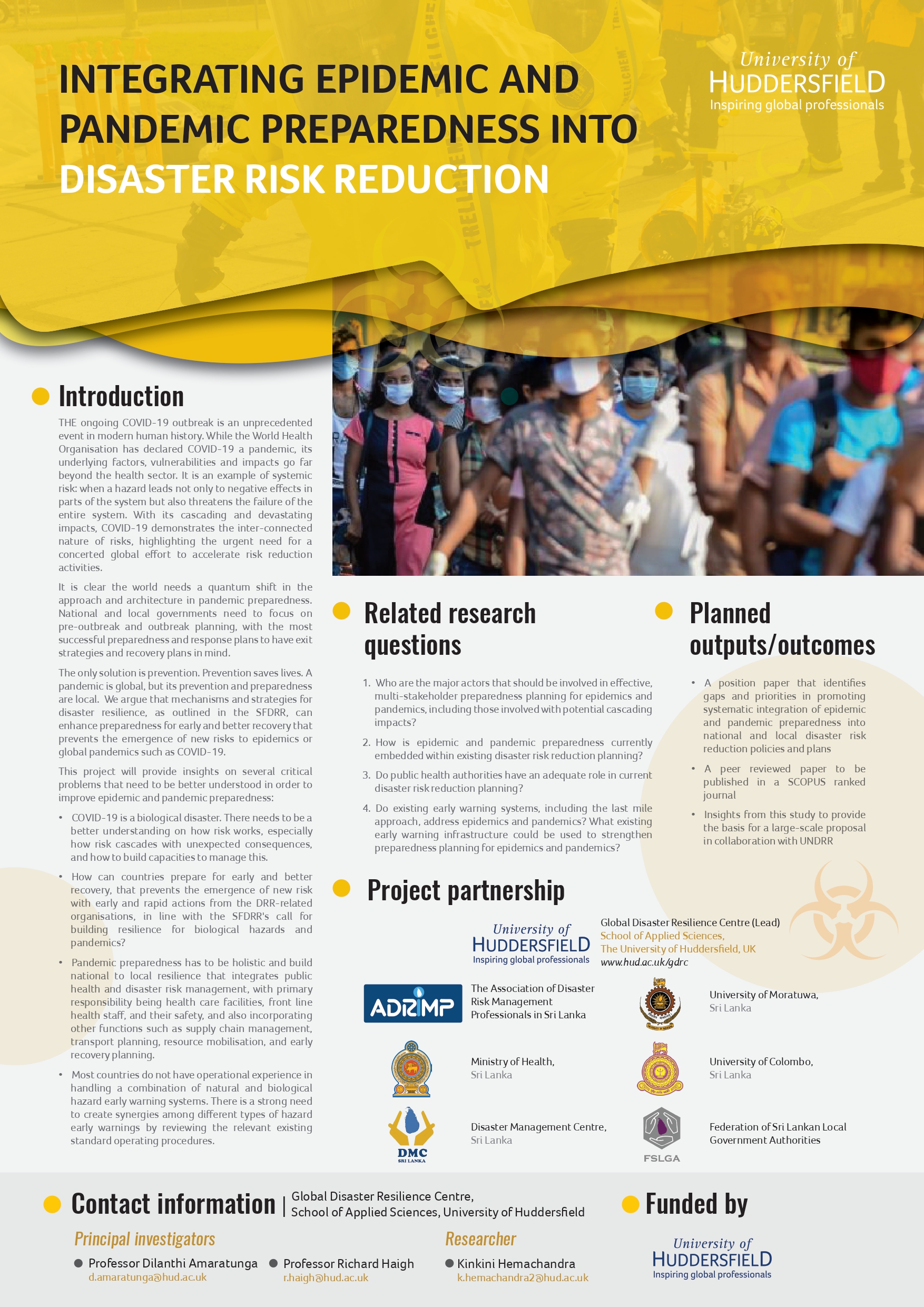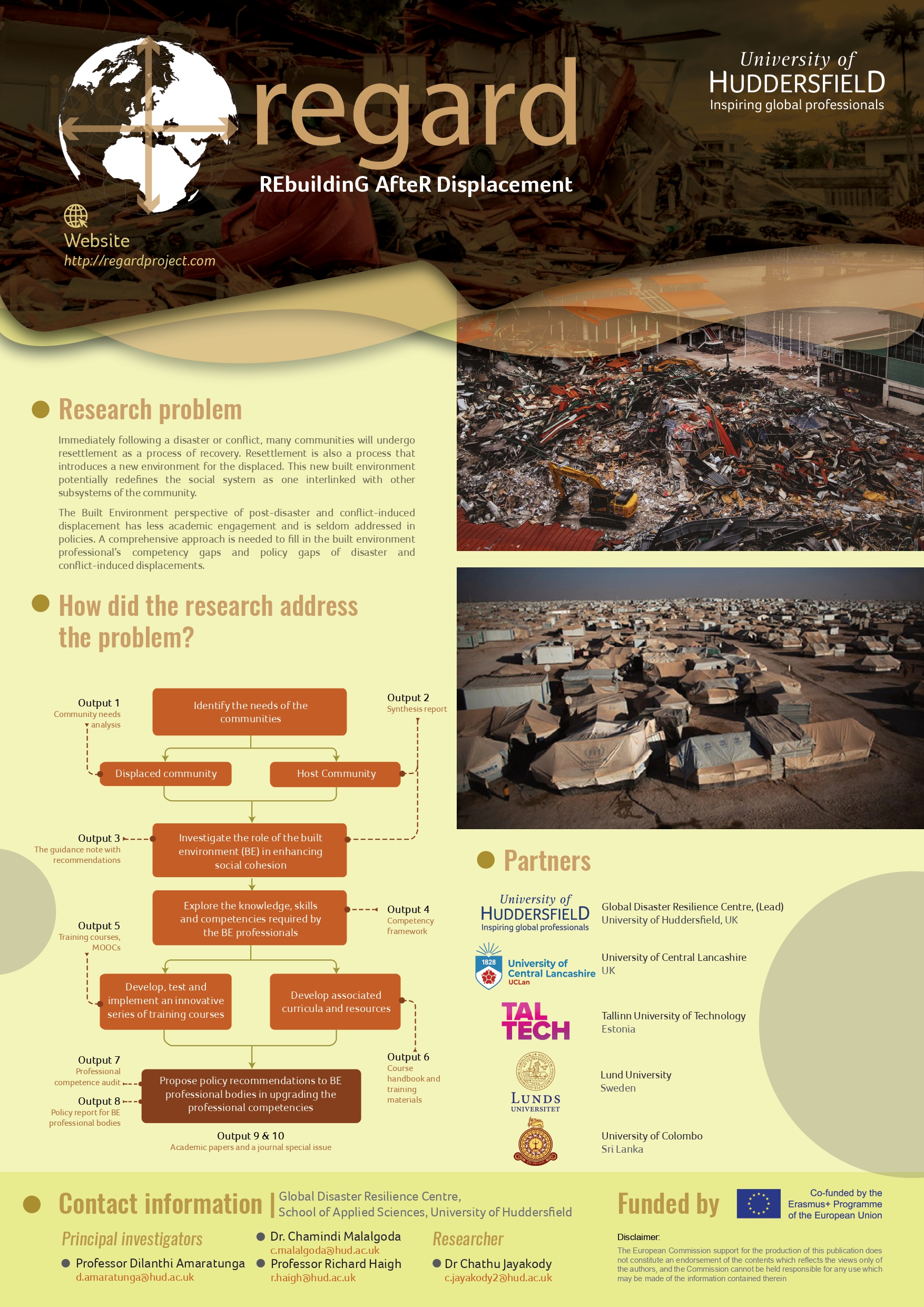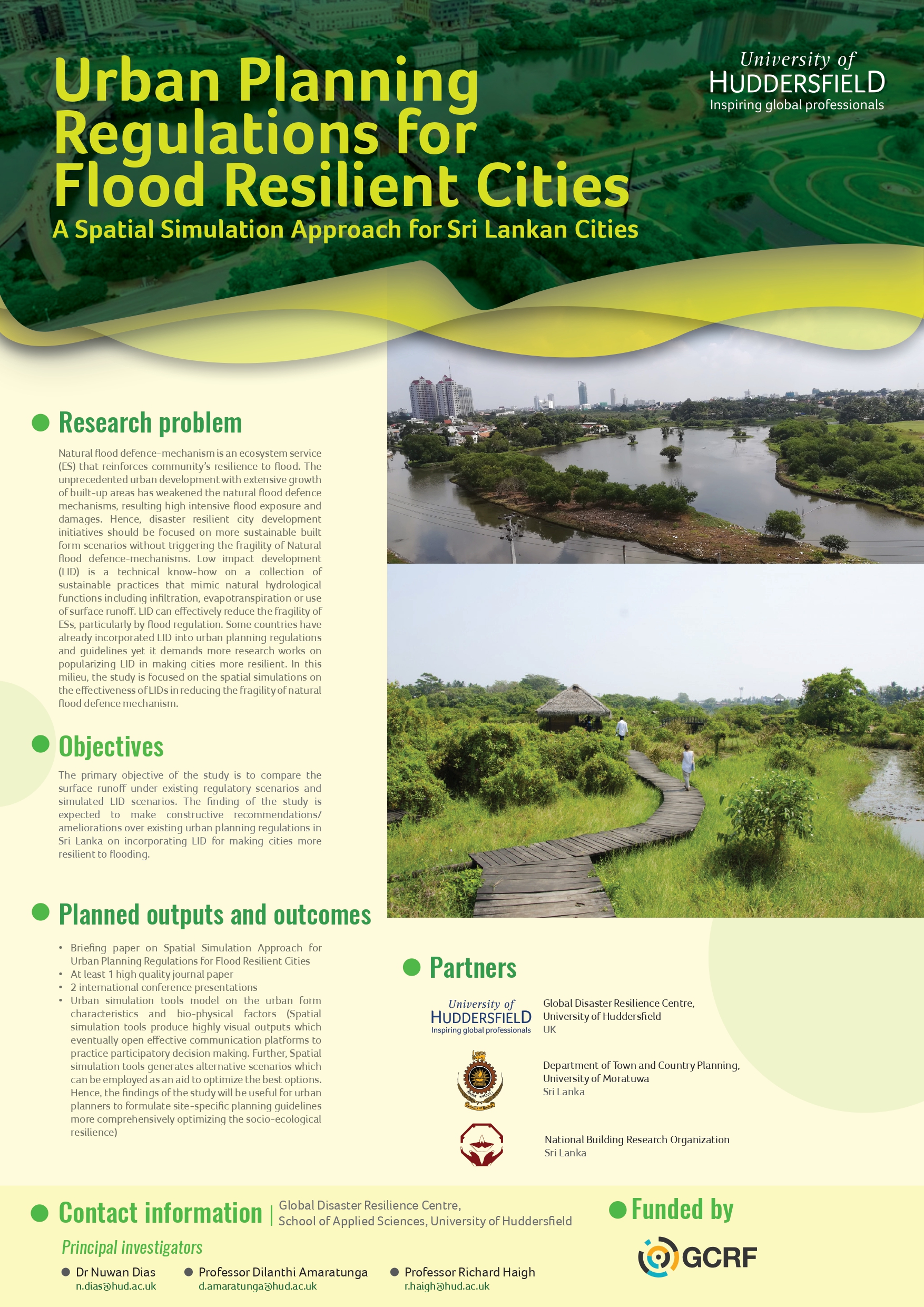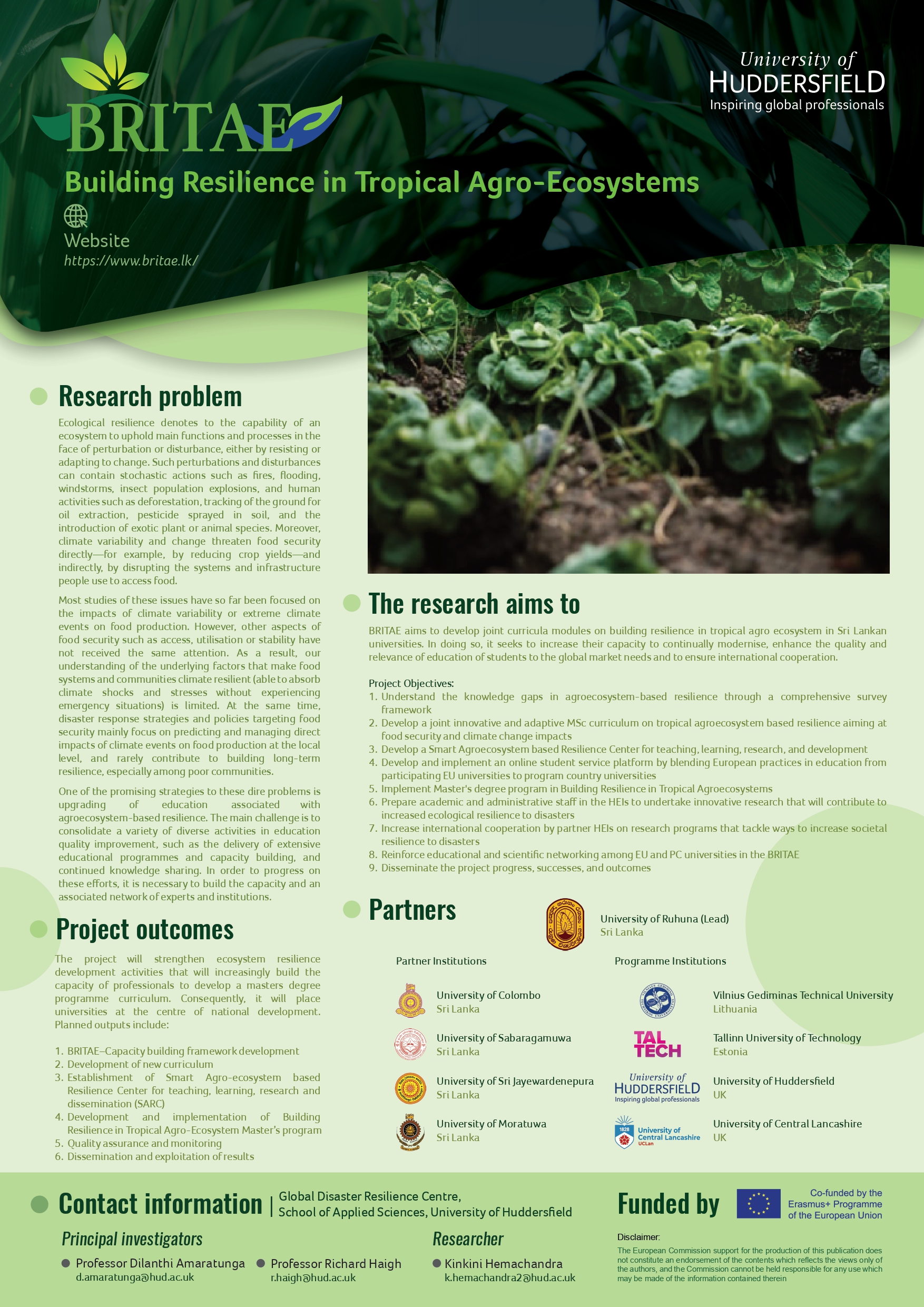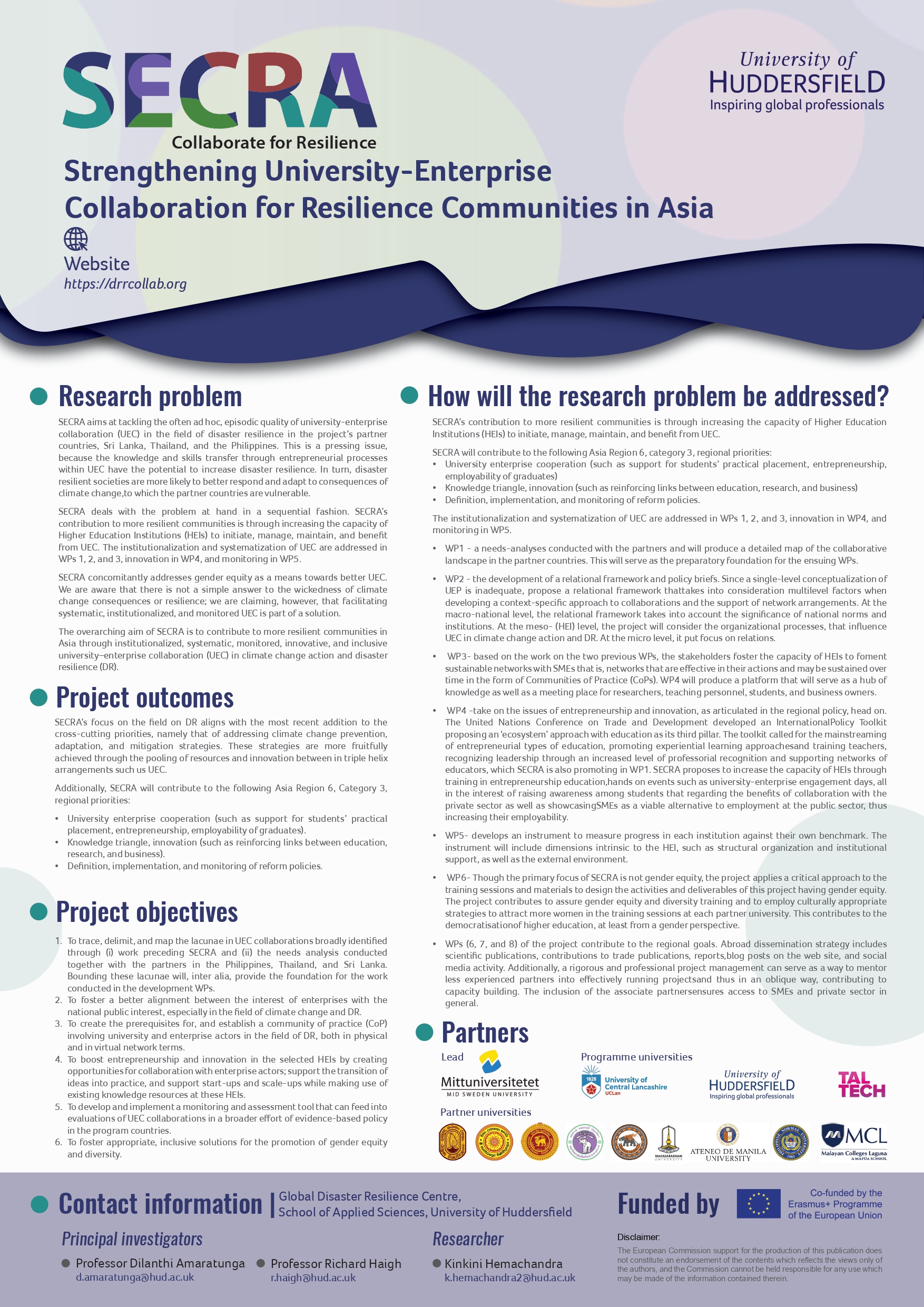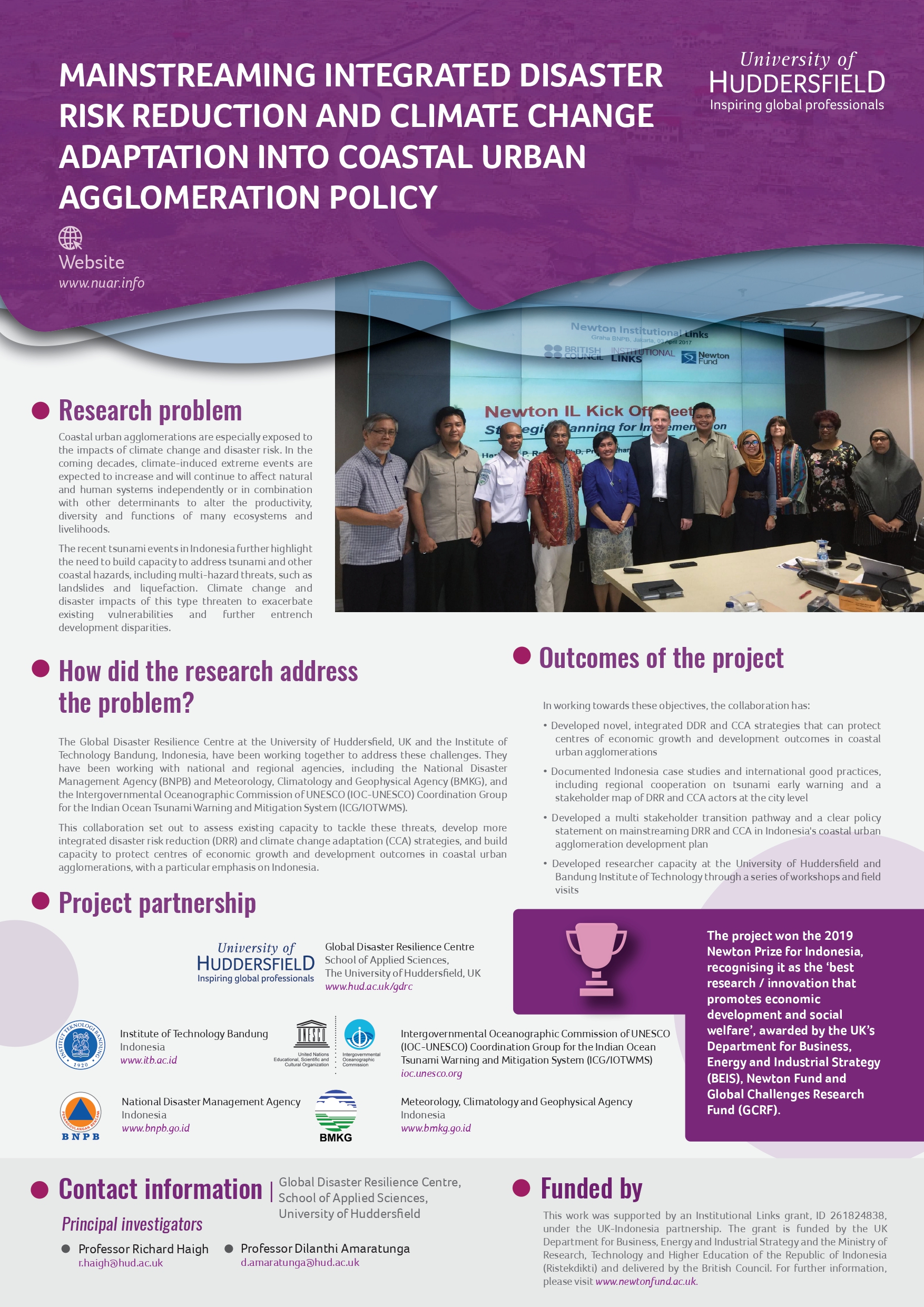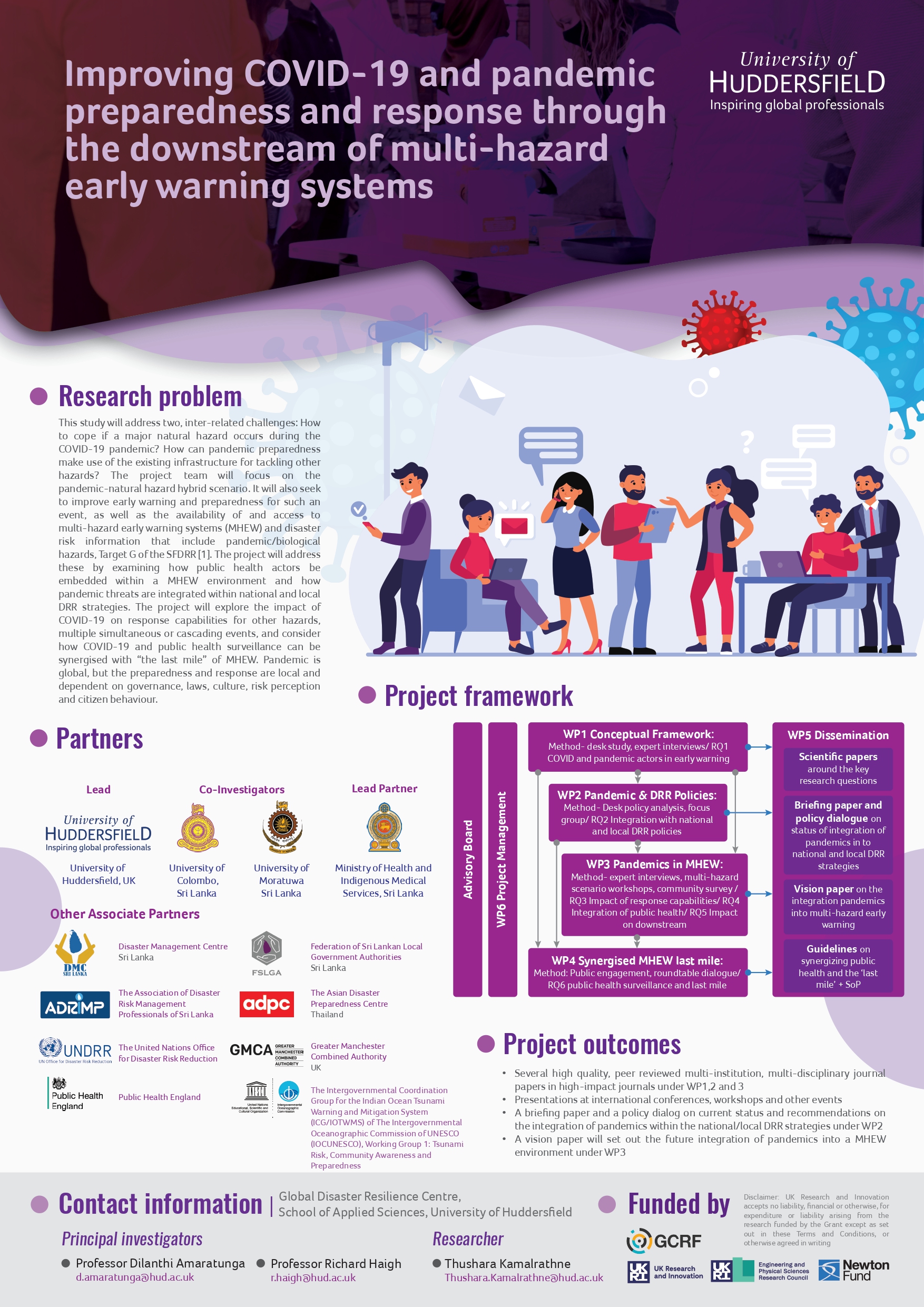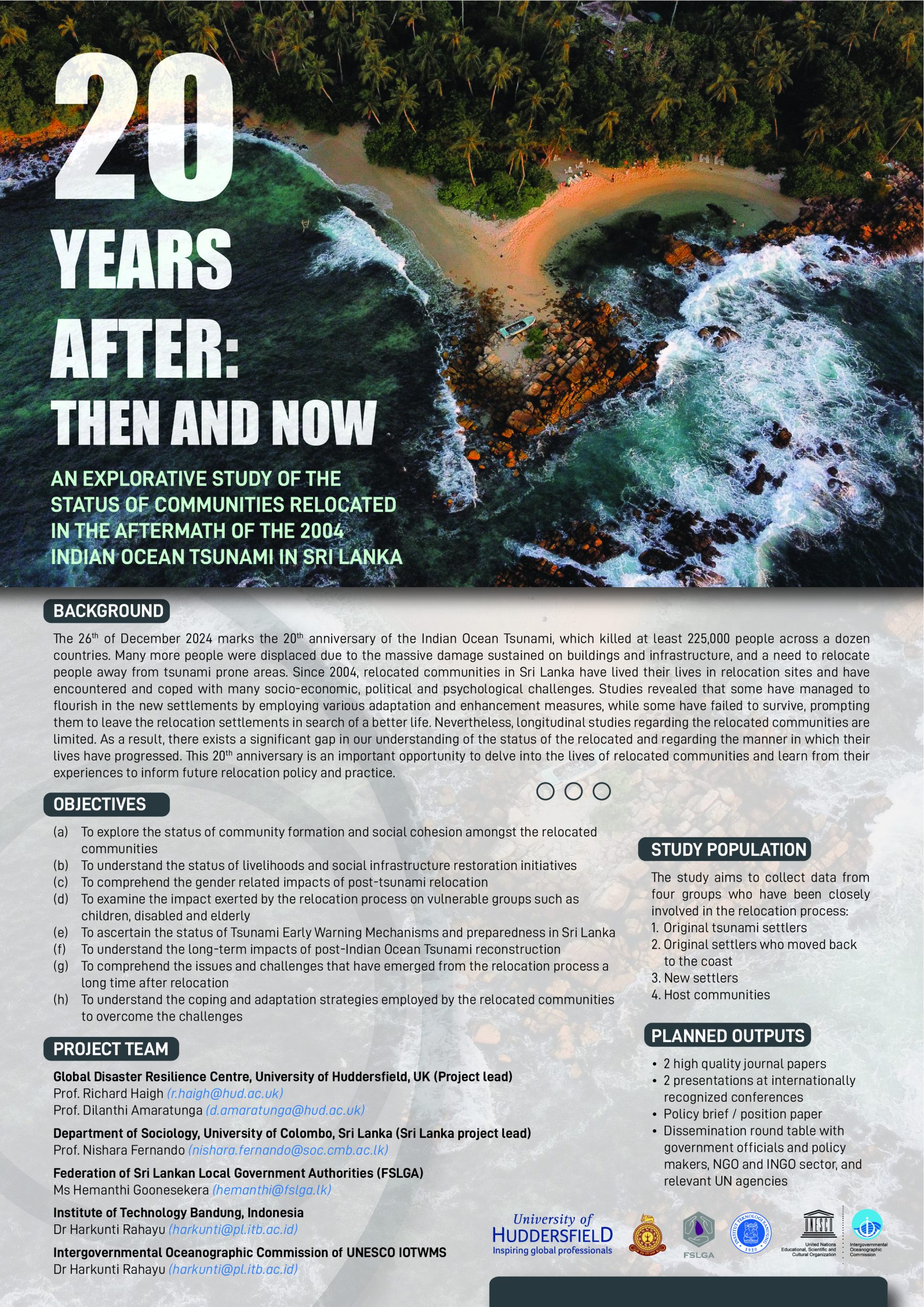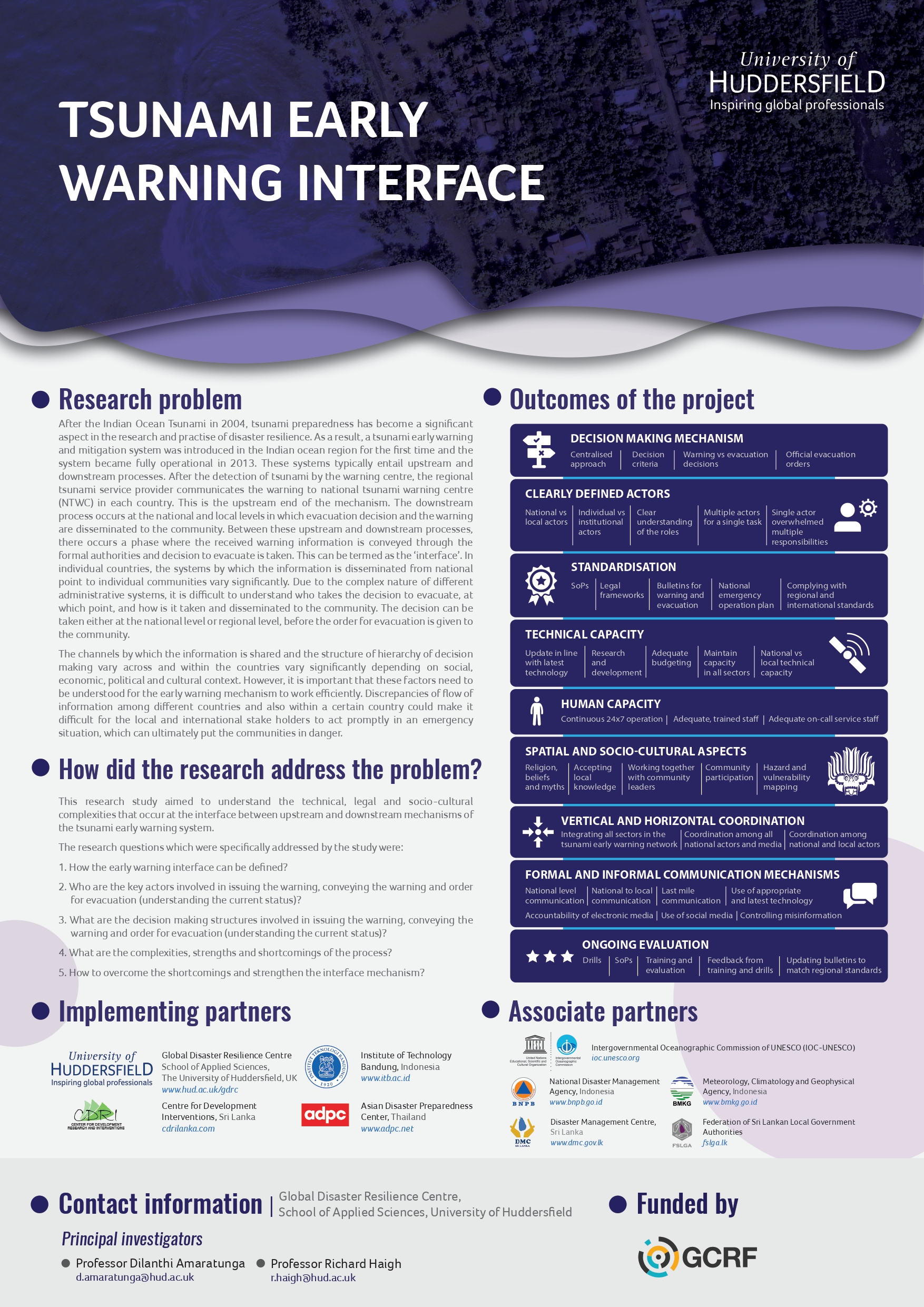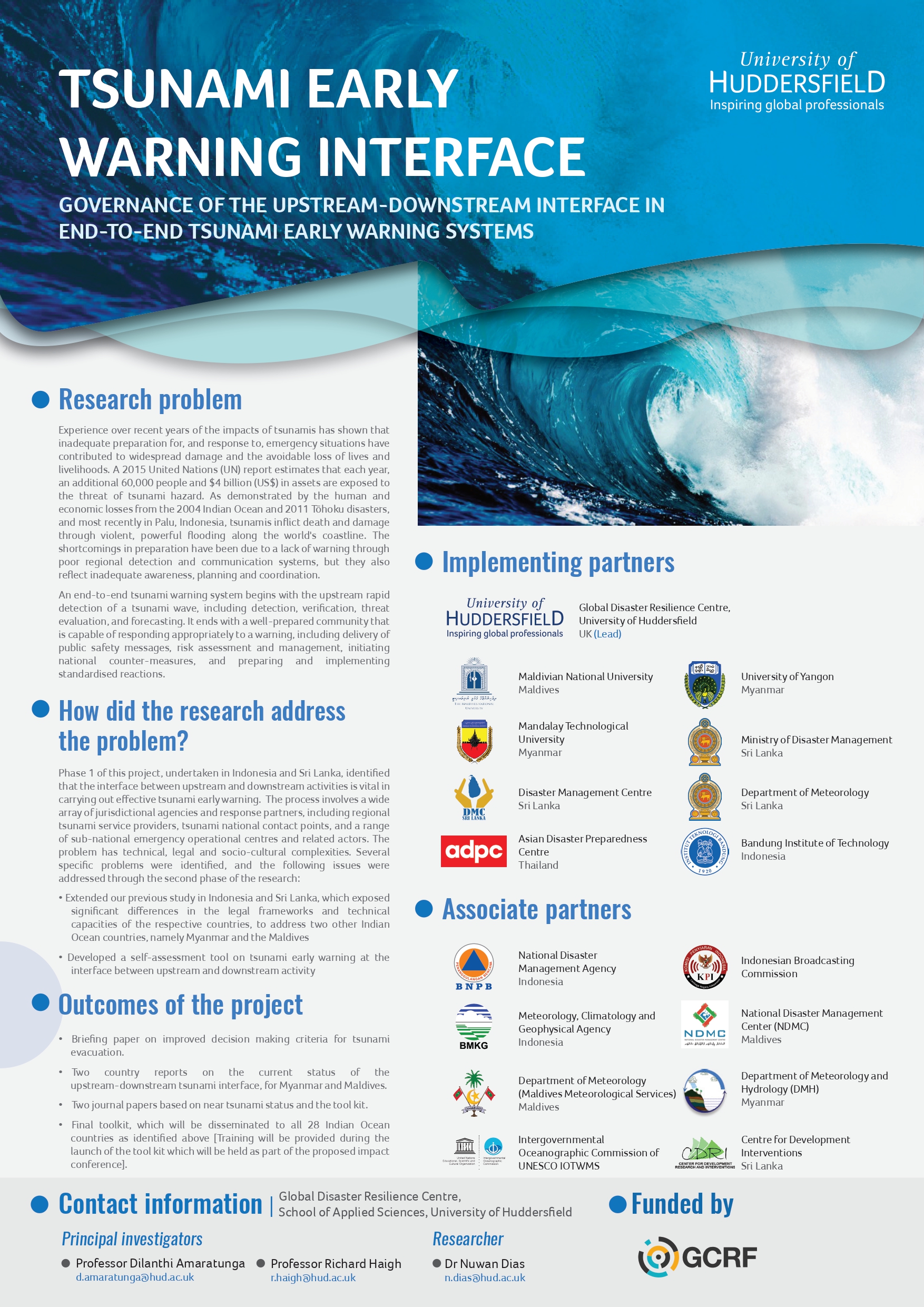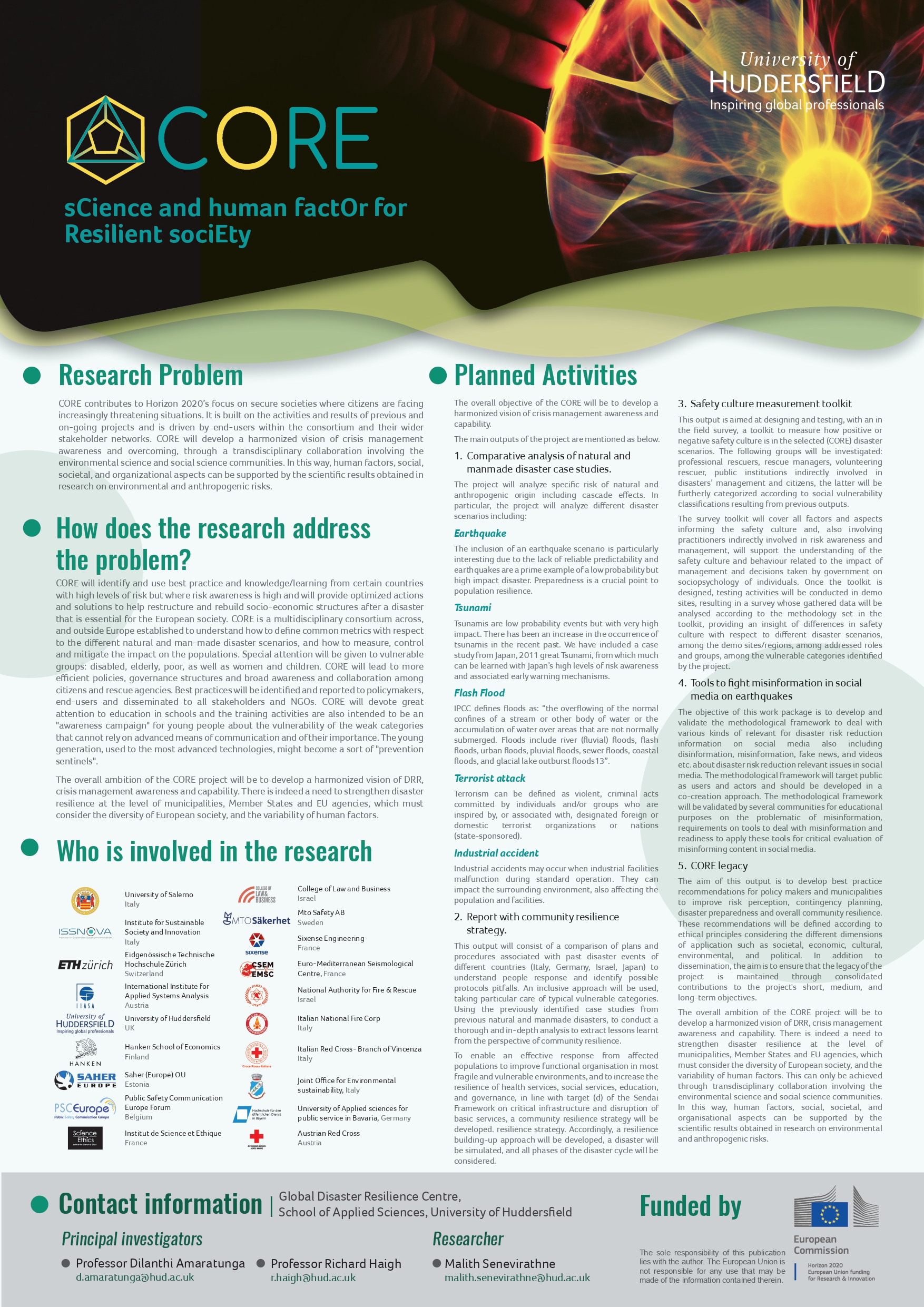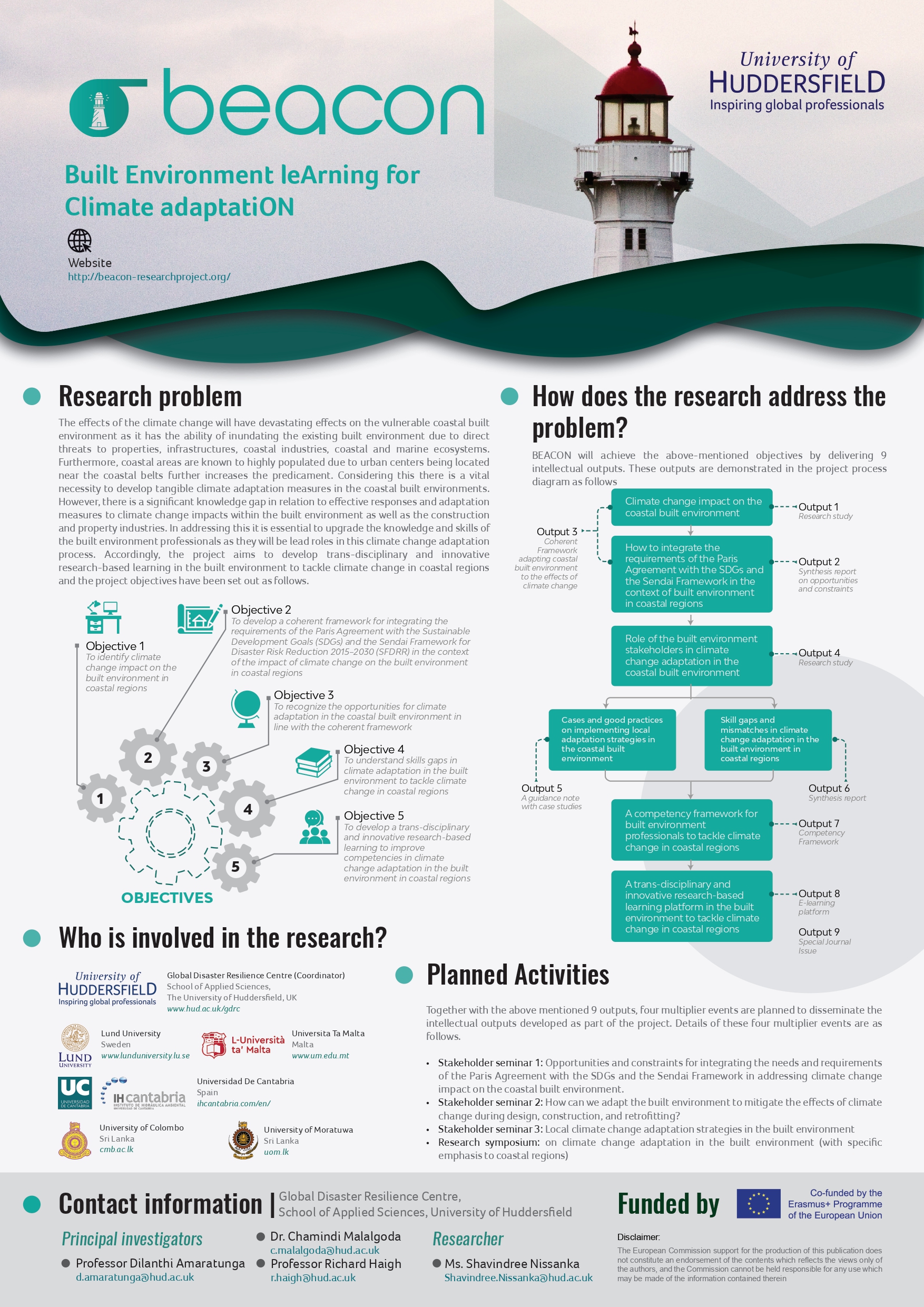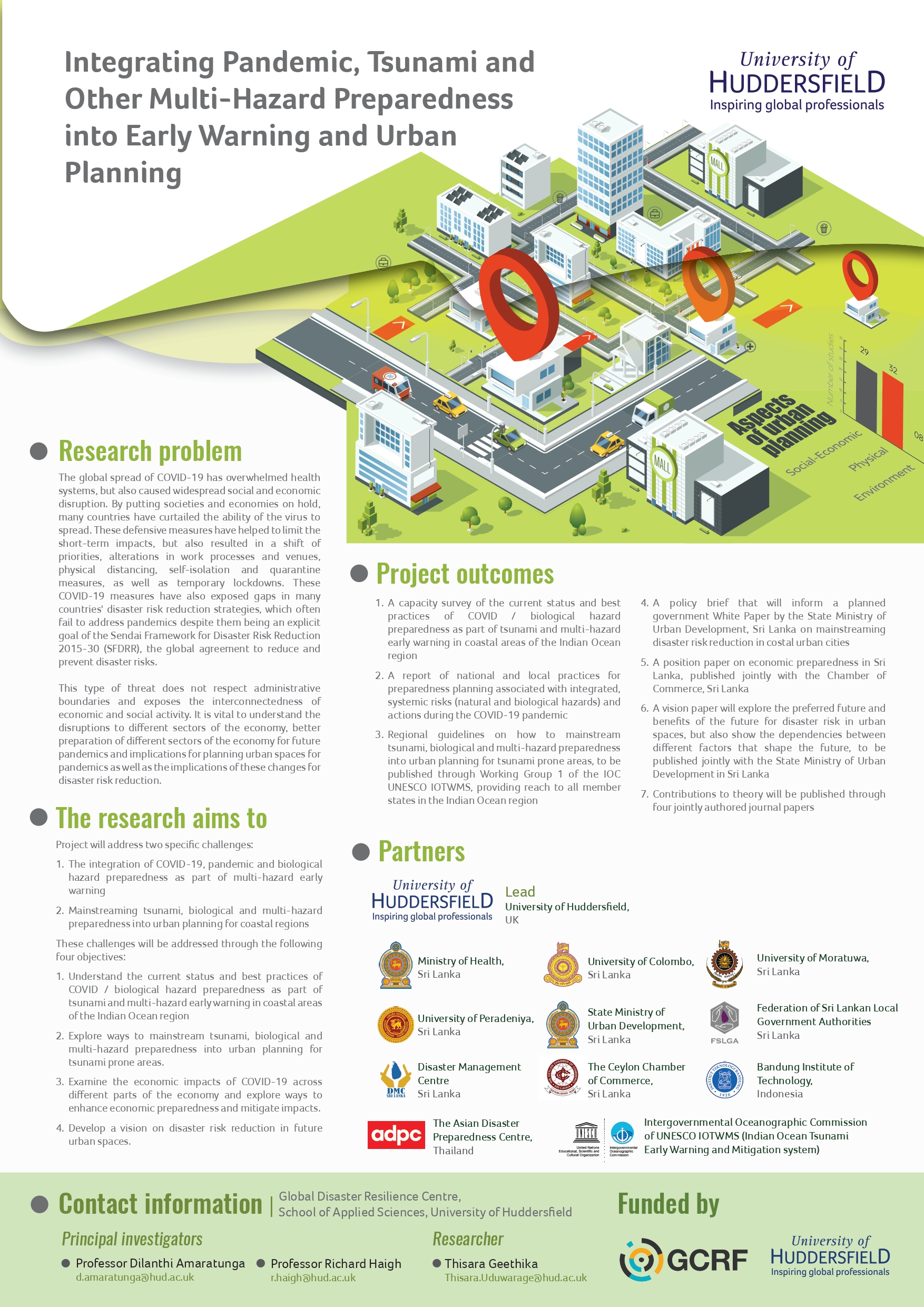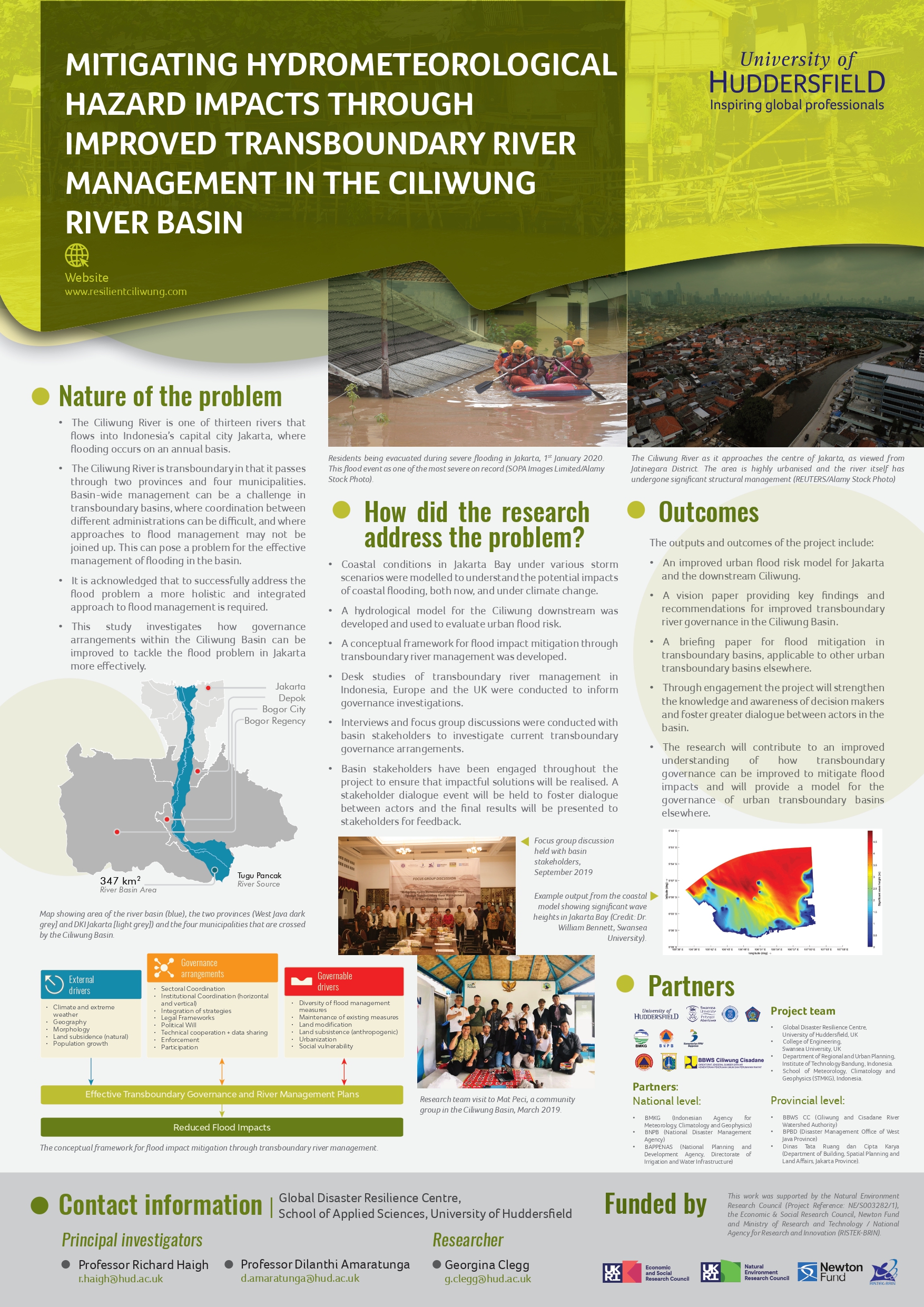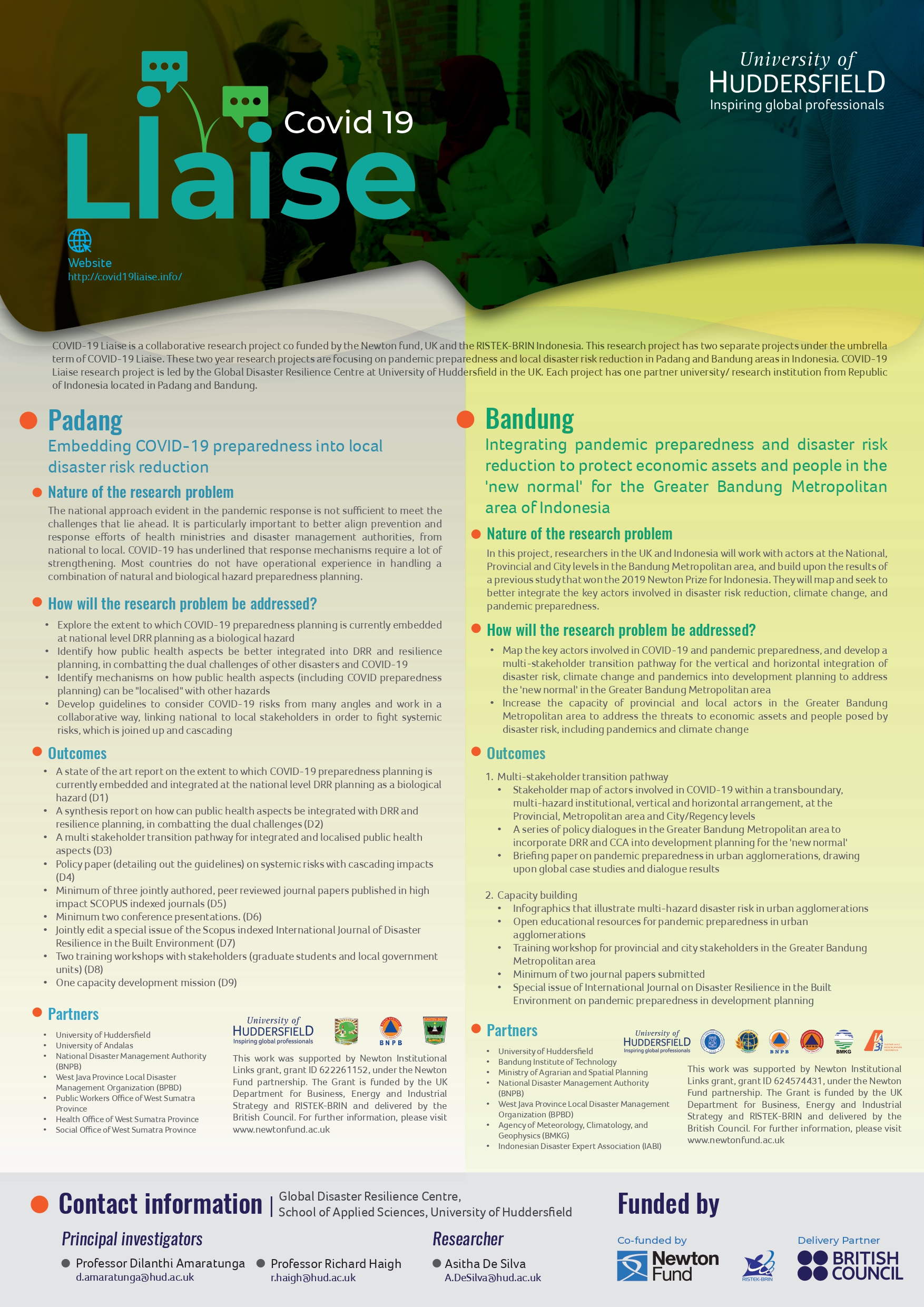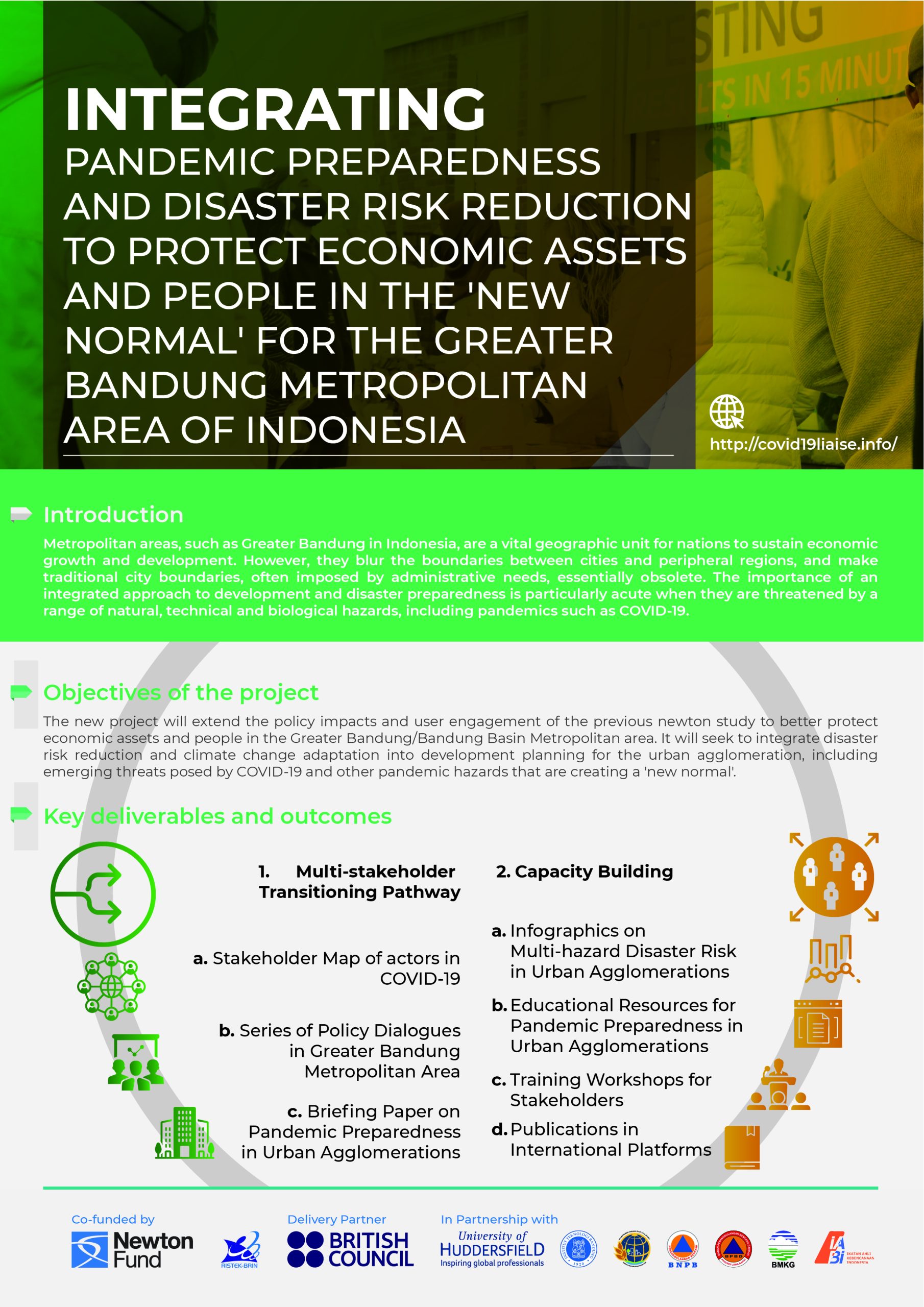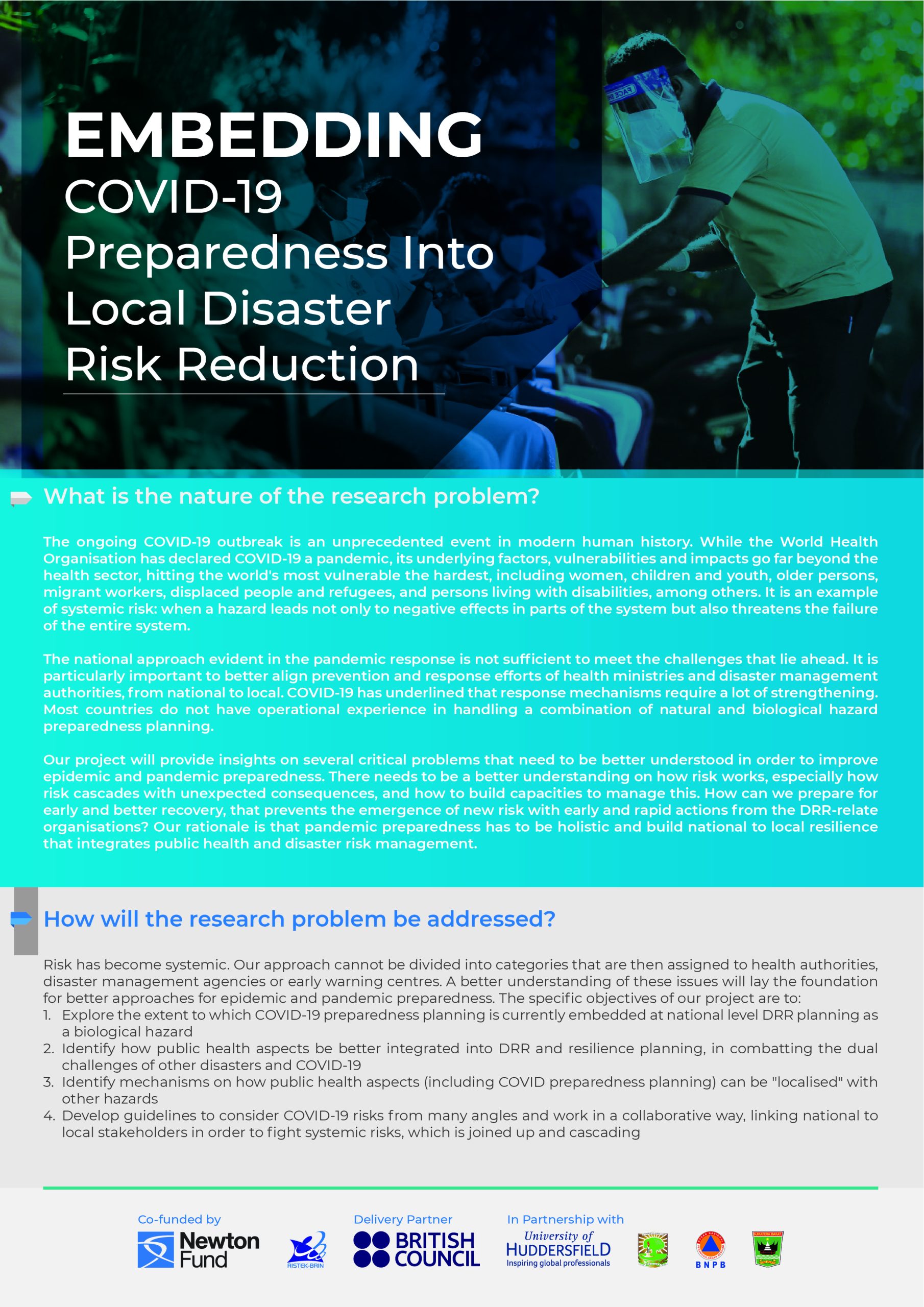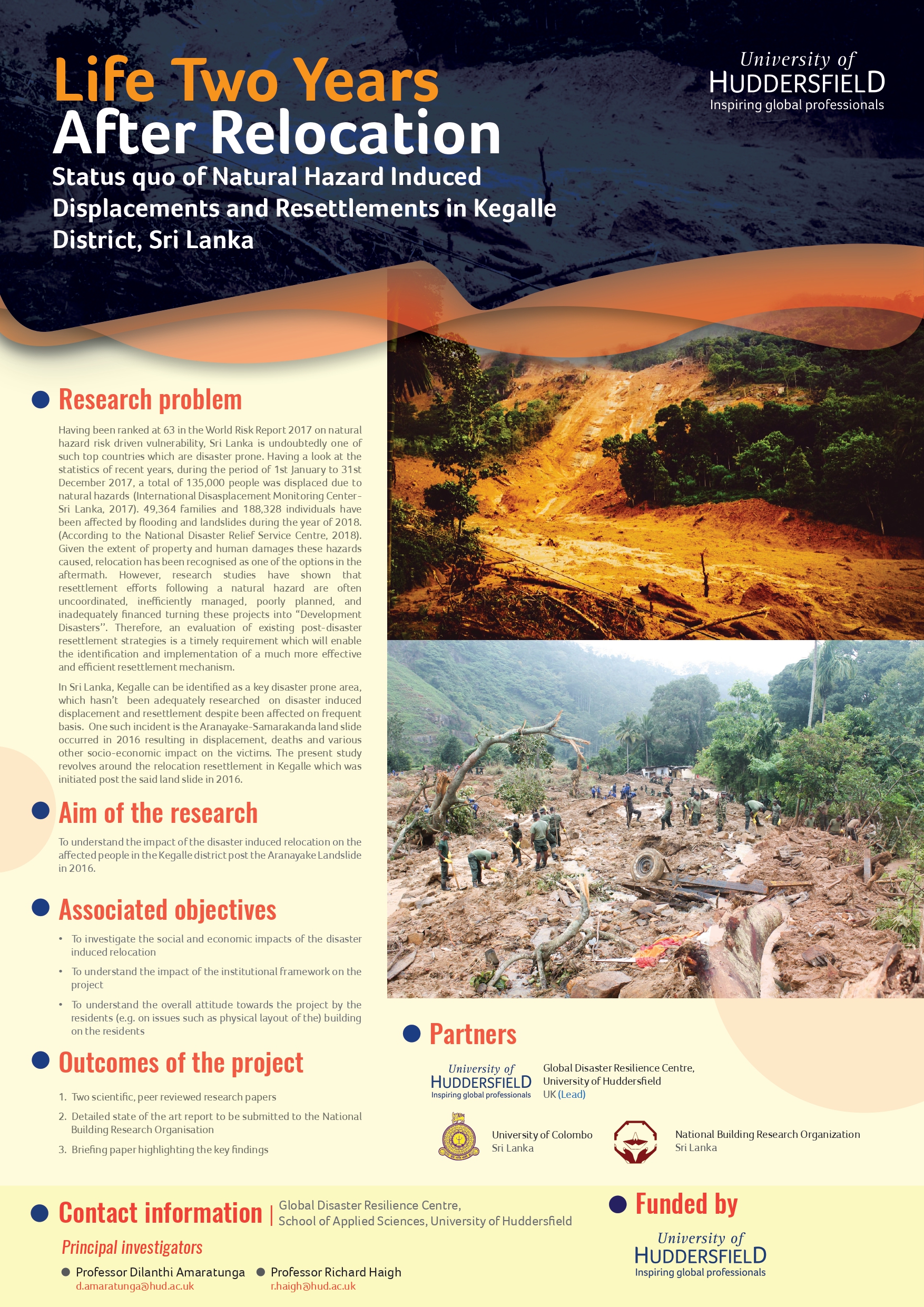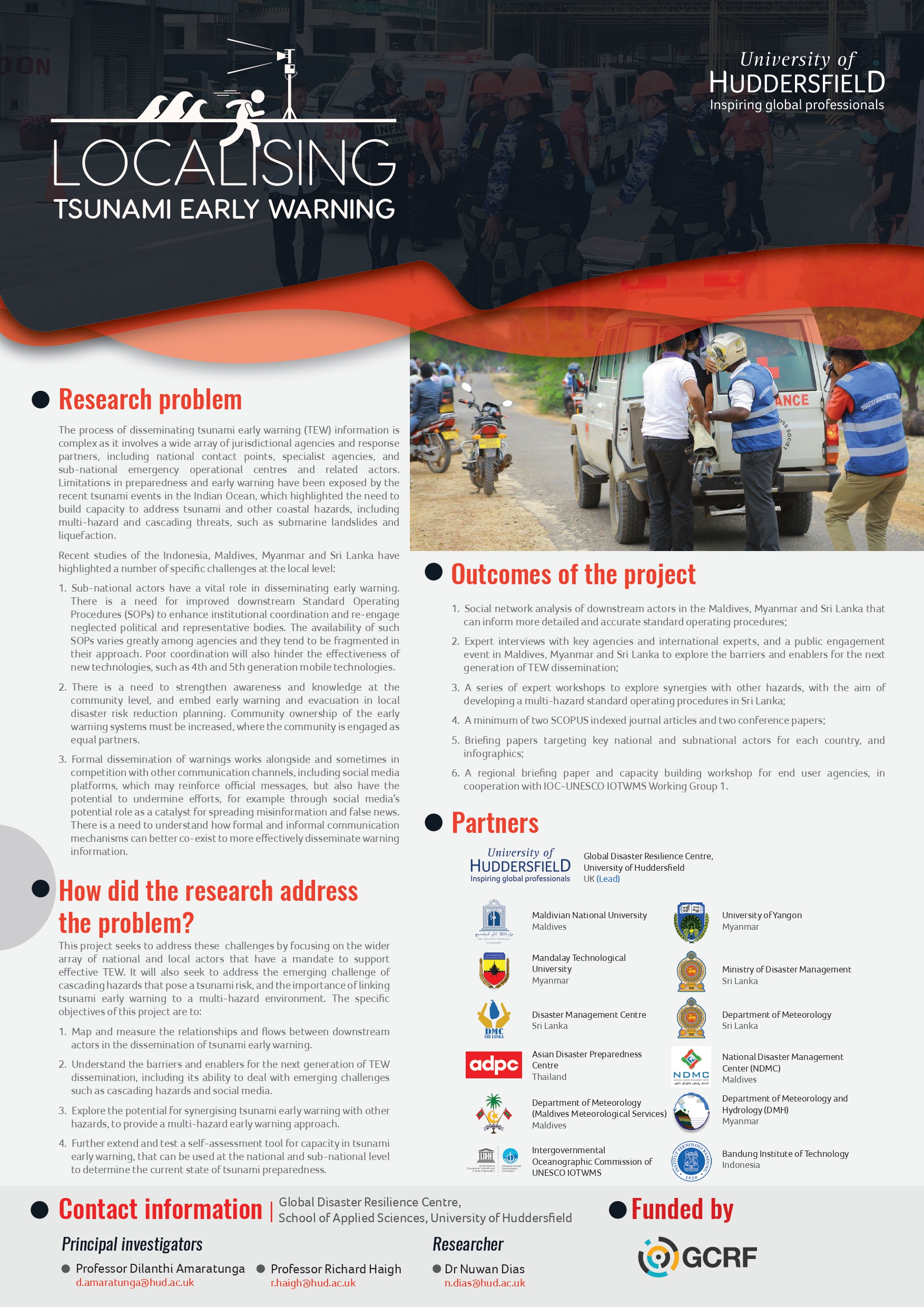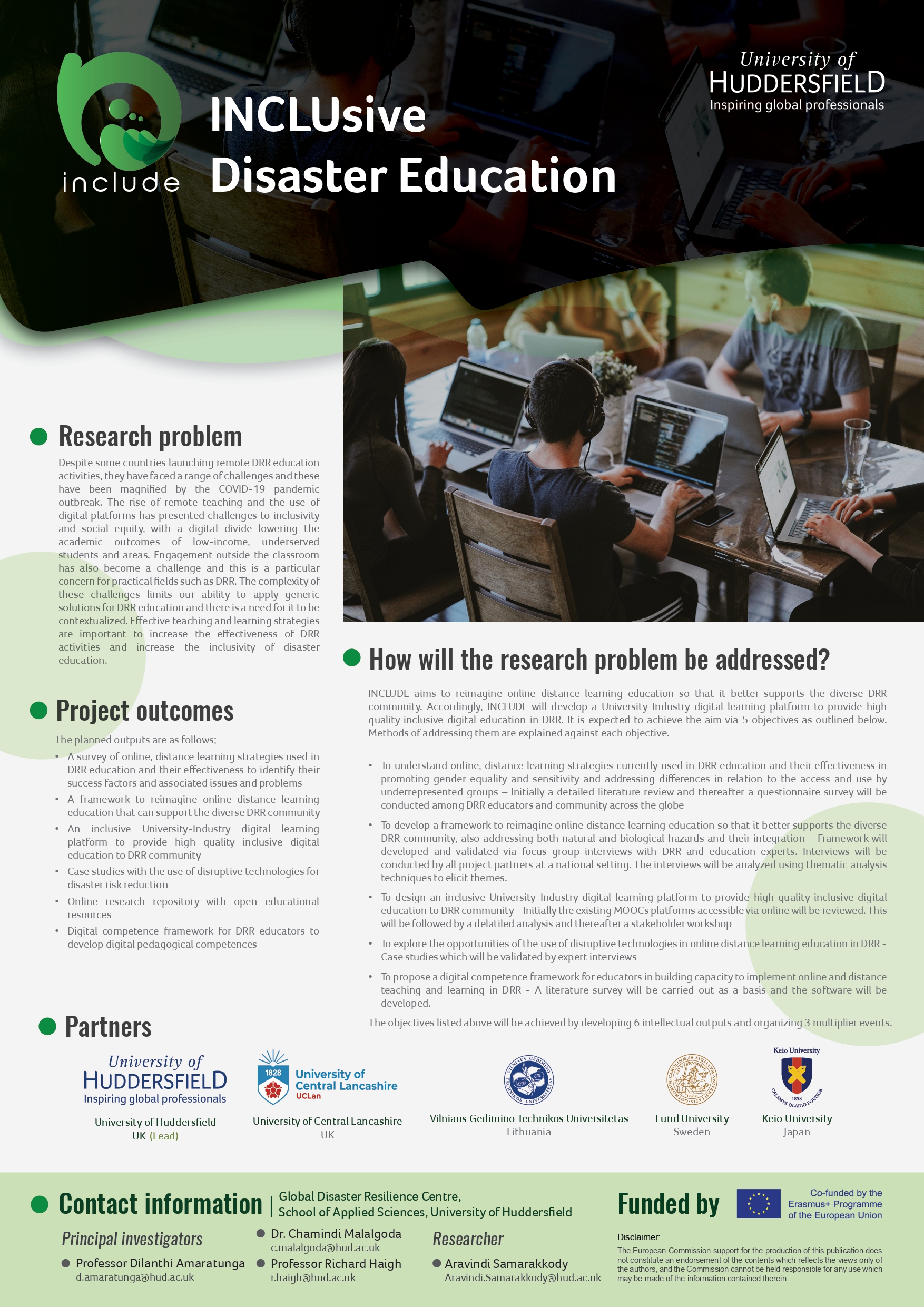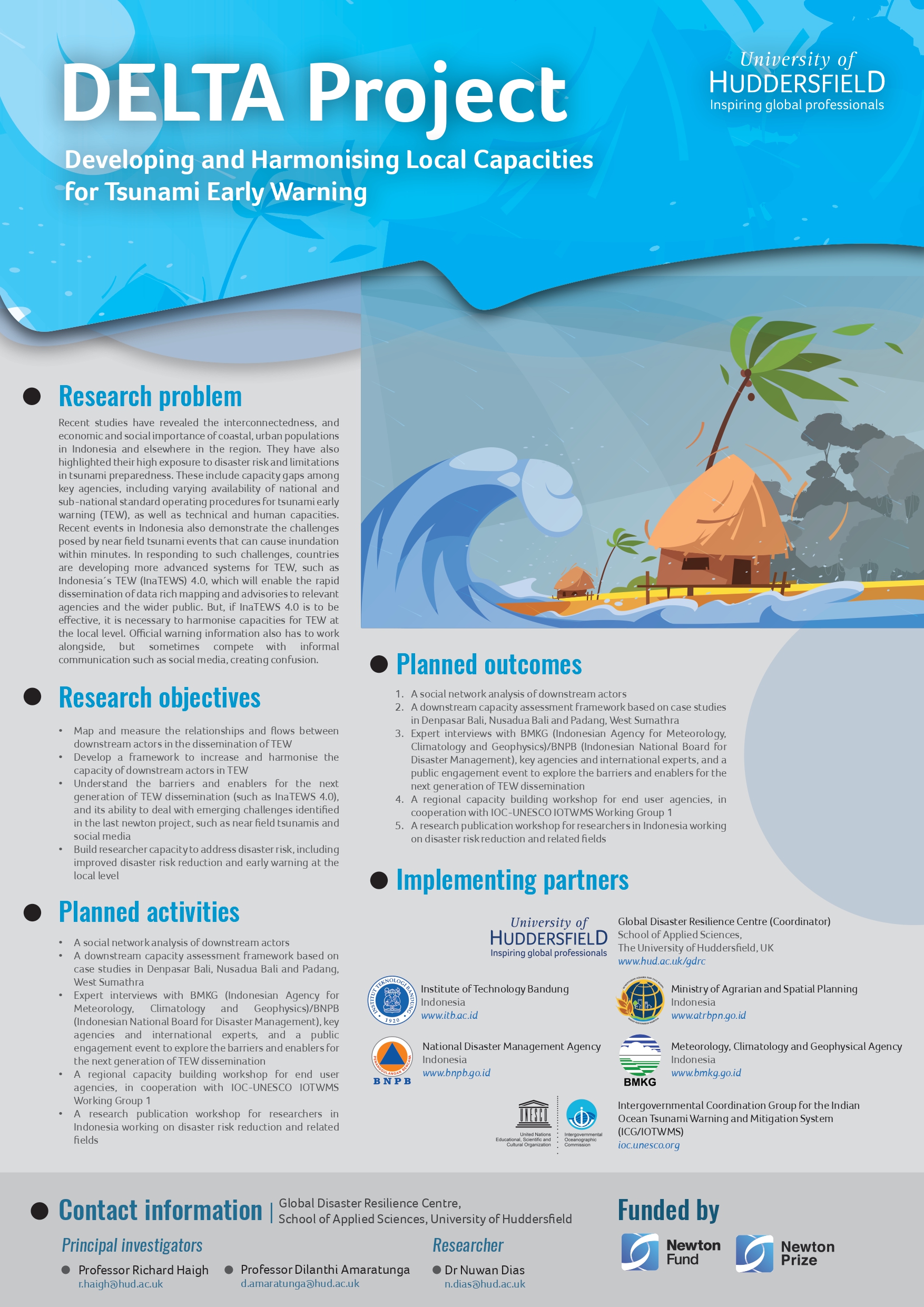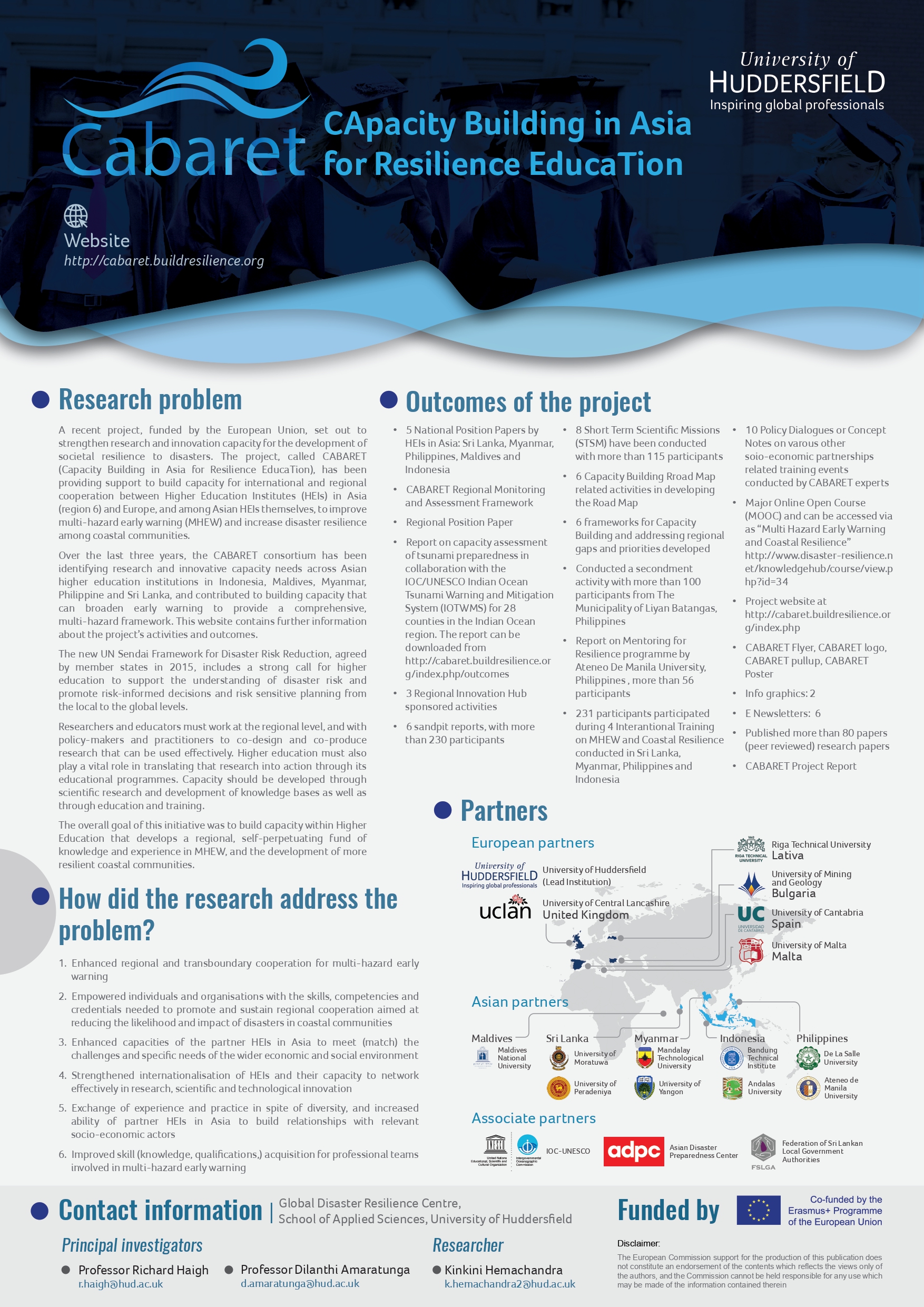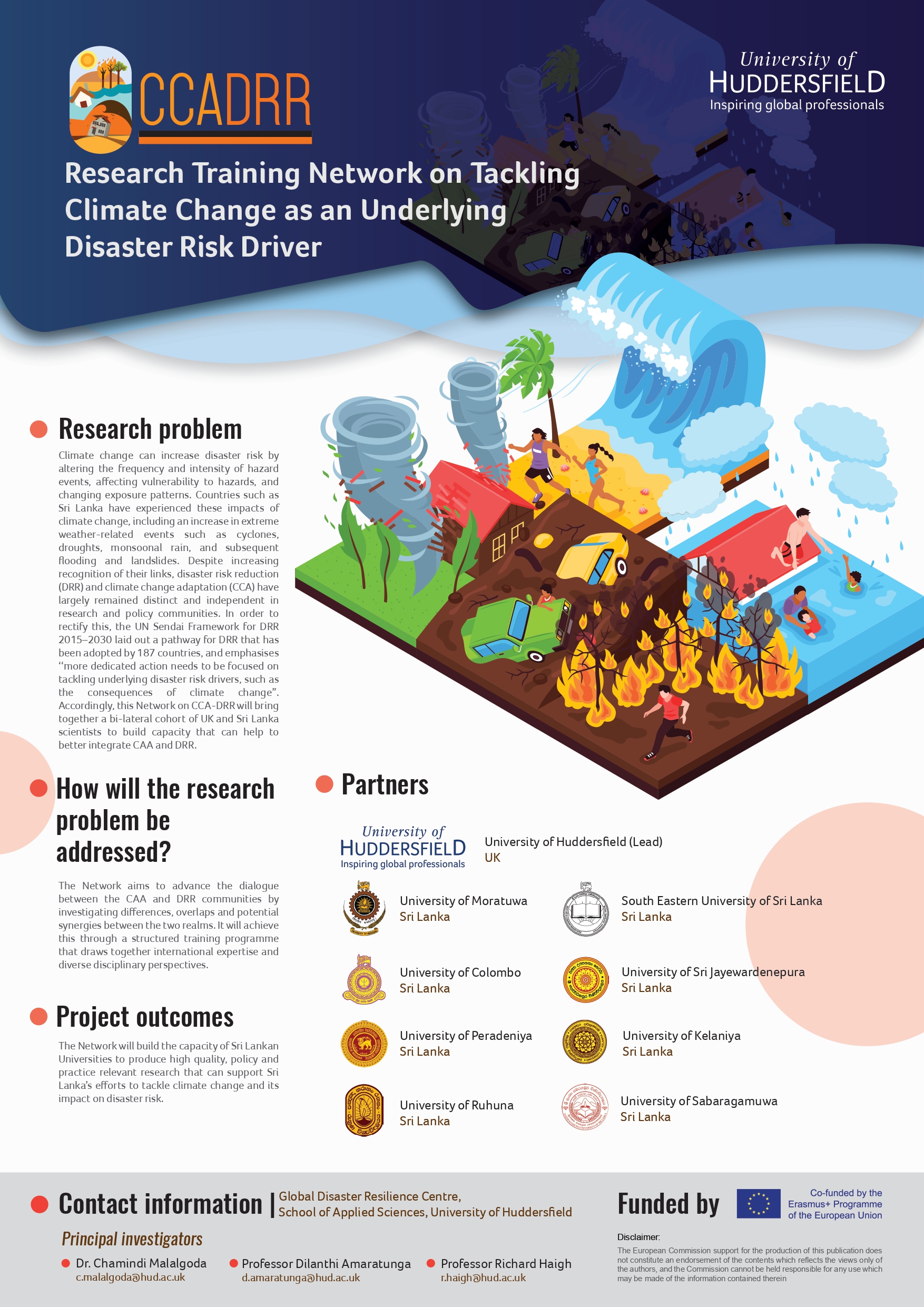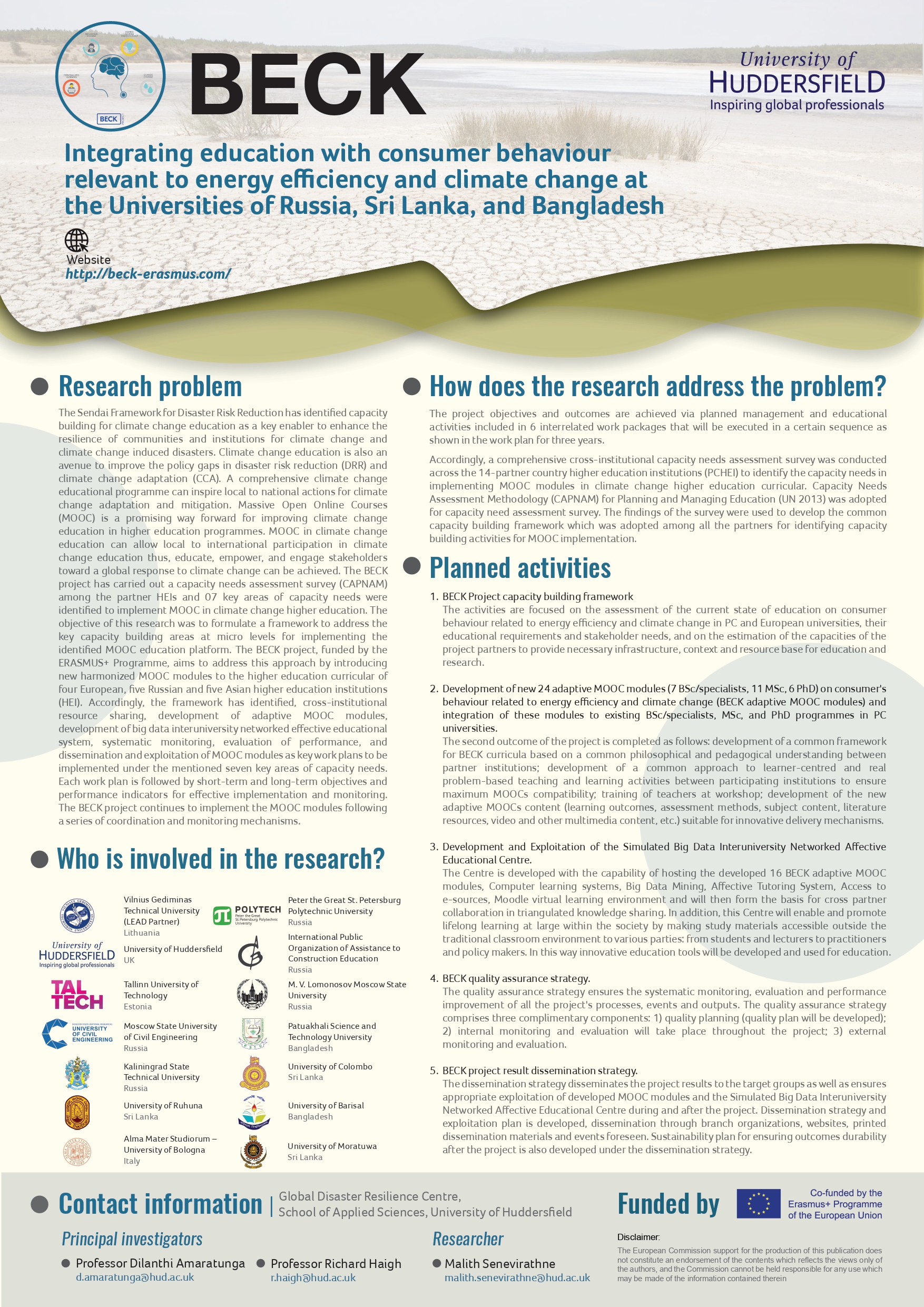Research Projects
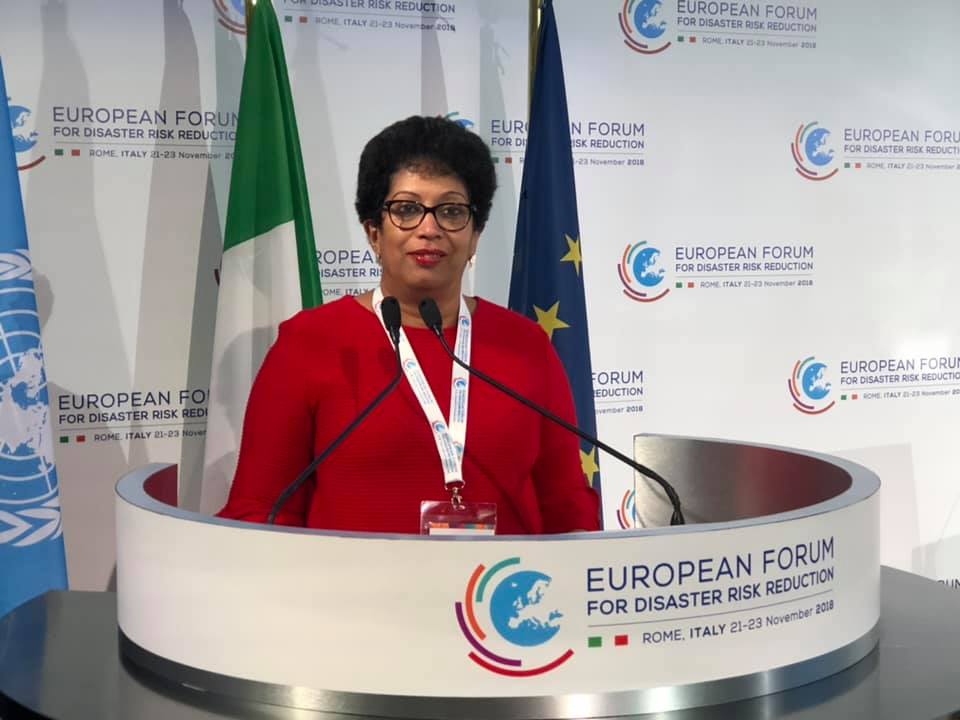
Project Poster Gallery
Current Projects
Aims to: Identify key factors contributing to successful recovery efforts to build back better; Evaluate the readiness-related effectiveness of existing governance structures, policies, capacity, data, knowledge, financing, and practices; Compile a list of primary indicators that contribute to measuring readiness for recovery; and Provide recommendations for strengthening readiness for recovery. ADPC and CUDRR+R. Funded by UNDRR. $ 265,000. 2024 – 2025.
20 years after – then and now: An explorative study of the status of communities relocated in the aftermath of the 2004 Indian Ocean Tsunami in Sri Lanka (Project PI).
Download the project flyer from here.
An explorative study of the status of communities (Original Tsunami settlers; Original settlers who moved back to the coast; New settlers; Host community) relocated in the aftermath of the 2004 Indian Ocean Tsunami in Sri Lanka;
Project partners: University of Huddersfield, UK and SPAARC, University of Colombo, Sri Lanka, Federation of Sri Lankan Local Government Authorities (FSLGA); 2022 – 2024;
Funder: URF; £ 18500
Project PI
Download Padang project flyer from here.
Download Bandung project flyer from here.
This project will strengthen disability inclusion in DRR by promoting equal access and opportunity for learners with disabilities on related undergraduate, postgraduate, research and continuous professional development programmes in Indonesian higher education. In doing so, it will help persons with disabilities to be active participants and not overlooked in disaster preparedness, relief and response actions;
4 partners from the UK and Indonesia; £ 30,000;
Funder: British Council UK-Indonesia Disability Inclusion Partnerships Grant. 2024 – 2025.
Network partner and HUD PI
The overall aim of the Connect4Resilience Network is to connect various stakeholders from research, policy, practice, and society to:(1) better prepare and plan for future disaster(s) and crises;(2) better integrate and establish knowledge and implementation capacities for resilient and sustainable DRR planning and doing; (3) build capacity and create awareness of the role of social work and social services in disaster contexts; and (4) foster societal transformation on various scales (SDG1, SDG5, SDG10, SDG11, SDG17);
Partnership: 9 institutions from 14 countries; € 500,000 approx.;
Funder: Swiss National Science Foundation (SNF). 2023 – 2026
Developing the foundation to establish a Research Institute on Resilient Societies to support successful research areas at the University to transition from Centre to Institute status;
Funder: University of Huddersfield, URF Scheme; £ 140,000; COI;
Partnership: 34 partners from 18 countries. 2022 – 2024
Sub-projects linked to the Centre for research institute on resilient societies (where I am a Co-I):
- Bridging urban resilience implementation challenges in tackling climate-related disasters. (UrbnRes) – This study aims to gain an understanding of the mechanisms to bridge urban resilience implementation challenges in tackling climate related disasters; Countries: UK and Sri Lanka.
- An assessment of entrepreneurial resilience among entrepreneurs in South Asia. This study aims to explore the themes around resilience among women entrepreneurs within the South Asian context, including the impact of recent disasters (e.g., COVID-19) and challenges caused by disasters on women entrepreneurs, and enablers to increase their resilience; Countries: UK and Sri Lanka, 3 partners.
- Developing a Localised Business Management Toolkit for Small to Medium Scale Business Enterprises, 3 countries and 6 partners.
Aims to establish the Centre for Biomimetic Societal Futures at the University of Huddersfield;
Funder: University of Huddersfield, URF Scheme; £347,359;
Partnership: 16 partners from 10 countries – Helmholtz Centre for Env. Research; Pepperdine University, California, USA; University of Nottingham, UK; Institute of Education, University of Tartu, Estonia; School of Geography and the Environment, University of Oxford, UK; Institute for Sociology, JGU Mainz, Germany; DiECO and Center for Nonlinear and Complex Systems, University of Insubria, Italy; Victoria University of Wellington, New Zealand; UCL, UK; Cranfield University, UK; Chalmers University of Technology (Division Design & Human Factors), Sweden; University of Southern, Denmark; EU Commission and Policy Fellow Alum, for the Centre for Science and Policy at the University of Cambridge. UK ; Leipzig, Germany; IBM Thomas J. Watson Research Centre, Yorktown Heights, NY USA ; STFC Hartree Centre, Daresbury, Cheshire; 2022 – 2024
Linked sub projects (where I am a Co-I):
- Raising awareness and understanding of nature inspired solutions (NIS) for disaster risk reduction (DRR). It focuses on raising awareness among built environment professional bodies, of the potential for using nature inspired solutions to reduce disaster risk. It will carry out two case studies to understand how nature’s forms, processes, and ecosystems have helped to reduce disaster risk related to tsunamis and landslides. These will be used as a basis to inform/inspire the development of solutions in the built; Project co-lead; £ 18,000; 12 partners from 5 countries.
- Mimicking the natural hydrological processes using green and blue infrastructure to enhance flood resilience within the existing urban environment, Co-I; £ 5600. 7 partners from 2 countries.
- An investigation of the applicability of biomimicry concepts in social enterprises’ resilience. This study is investigating the potential applicability of biomimicry in social enterprises to enhance their resilience, and thereby to understand the concepts related to social enterprises, biomimicry and resilience; Co-I; £ 8,000; 5 partners in the UK and Sri Lanka.
Hub aims to deliver solutions for smart design, socio-technical change, novel materials, accelerated testing methods, predictive modelling, circular life cycle costing and translation field trials providing significant benefits enabling progress towards a circular economy.
Funder: Australian Research Council (ARC)
Value: $12.4 million cash + $6 million in kind
Our role: International expert and Co-Investigator
Partnership: 33 industry partners, 9 Australian universities, 4 international institutions from 5 countries
Download the project poster from here.
Scheme: H2020: SU-DRS01-2018-2019-2020 Human factors, and social, societal, and organisational aspects for disaster-resilient societies, Research, and Innovation actions Innovation actions
HUD team: Prof. Dilanthi Amaratunga and Prof. Richard Haigh
Duration: 3 years (2021 – 2024)
Value: € 5.2 million
Partners: University of Salerno, Italy; Institute for Sustainable Society and Innovation, Italy; Eidgenössische Technische Hochschule Zürich, Switzerland; International Institute For Applied System Analysis, Austria; University of Huddersfield , UK; Hanken School of Economics, Finland; Saher Europe, Estonia; Psc Europe, Belgium; Institute for Science & Ethics, France; College of Law and Business , Israel; Mto Safety Ab, Sweden; Euro-Mediterranean Seismological Centre, France; Israeli National Fire Authority, Israel; Corpo Dei Vigili Del Fuoco, Italy; Croce Rossa Italiana, Italy; UCSA- Comuni vesuviani, Italy; Protezione Civile Trento, Italy; Hfoed Bayern, Germany
Download the project poster from here.
Funded by European Commission’s Strategic Partnerships for Digital Education Readiness Scheme.
University of Huddersfield team (Project lead): Prof. Dilanthi Amaratunga, Dr Chamindi Mlalgoda and Prof. Richard Haigh
Value: € 300,000.00
Duration: 2021 – 2024
Partners in this initiative include: UCLAN, UK; Lund University Sweden; VGTU, Lithuania; KEIO UNIVERSITY, Japan.
Associate partners: Swedish Civil Contingencies Agency (MSB); Sweden’s Statistics Bureau (SCB); UNDRR & ESTAG; Institute of Global Environmental Strategies, Hayama, Japan
Successfully completed projects at University of Huddersfield (since September 2014)
Download the project poster from here.
Funded by European Commission’s Strategic Partnerships for Higher Education Scheme.
University of Huddersfield team (Project lead): Prof. Dilanthi Amaratunga, Dr Chamindi Mlalgoda and Prof. Richard Haigh
Value: € 300,000.00
Duration: 2021 – 2024
Partners in this initiative include Lund University, Sweden; University of Cantabria, Spain; University of Malta, Malta; University of Colombo, Sri Lanka; and University of Moratuwa, Sri Lanka
Download the project poster from here.
Funded by: UKRI/GCRF/EPSRC.
University of Huddersfield team (Project lead): Prof. Dilanthi Amaratunga & Prof. Richard Haigh
Duration: 2020 – 2022
Partners: University of Moratuwa, Sri Lanka; University of Colombo, Sri Lanka; Ministry of Health, Sri Lanka; Disaster Management Centre, Sri Lanka; Federation of Sri Lankan Local Government Authorities, Sri Lanka; The Association of Disaster Risk Management Professionals of Sri Lanka (ADRiMP); The Asian Disaster Preparedness Centre, Thailand; UNDRR (The United Nations Office for Disaster Risk Reduction) & ESTAG (Science & Technology Advisory Group) of UNDRR; Greater Manchester Combined Authority (GMCA), UK; Public Health England; The Intergovernmental Coordination Group for the Indian Ocean Tsunami Warning and Mitigation System (ICG/IOTWMS) of The Intergovernmental Oceanographic Commission of UNESCO (IOCUNESCO), Working Group 1: Tsunami Risk, Community Awareness and Preparedness
Download the project poster from here.
Value: € 1 million.
Scheme: European Commission Erasmus+ CBHE.
Partnership: Mid Sweden University (Lead partner); University of Central Lancashire; University of Huddersfield; Tallinn University of Technology; University of Ruhuna; University of Sri Jayewardenepura; University of Peradeniya; Chiang Mai University; Naresuan University; Mahasarakham University ; Ateneo de Manila University; Philippine Normal University ; Malayan Coleges Laguna ; University Grants Commission (UGC); Ministry of Plantation Industry; State Ministry of Urban Development; Green Building Council of Sri Lanka; Institution of Engineers Sri Lanka; Chamber of Construction Industries; The Ceylon Chamber of Commerce; Dialog Axiata; Horizon College of Business & Technology; Lego International; International Center for Sustainable Built Environment; The Thai Chamber of Commerce; Foundation of Asian Disaster Preparedness Center; United Nations Office for Disaster Risk Reduction; Local Governments for Sustainability (ICLEI – South East Asia)
Download the project poster from here.
Funded by: QR/GCRF.
University of Huddersfield team (project lead): Prof. Dilanthi Amaratunga, Prof. Richard Haiugh
Value: £ 55,500.00
Partners in this initiative include: University of Moratuwa, Sri Lanka; University of Colombo, Sri Lanka; Ministry of Health, Sri Lanka; Disaster Management Centre, Sri Lanka; Federation of Sri Lankan Local Government Authorities, Sri Lanka; The Association of Disaster Risk Management Professionals of Sri Lanka (ADRiMP); The Asian Disaster Preparedness Centre, Thailand; UNDRR (The United Nations Office for Disaster Risk Reduction) & ESTAG (Science & Technology Advisory Group) of UNDRR; The Intergovernmental Coordination Group for the Indian Ocean Tsunami Warning and Mitigation System (ICG/IOTWMS) of The Intergovernmental Oceanographic Commission of UNESCO
Download the project poster from here.
Funded by: Newton Prize
Value: £ 200,000
University of Huddersfield team: Richard Haigh (PI) and Dilanthi Amaratunga(COI)
Partner country: Indonesia (ITB)
Download the project poster from here.
Value: € 910,000
Lead partner: University of Ruhuna, Sri Lanka
University of Huddersfield team: Dilanthi Amaratunga (PI) and Richard Haigh (COI)
Scheme: European Commission Erasmus+ CBHE
Partnership: University of Central Lancashire, UK; University of Huddersfield, UK; Tallinn University of Technology, Estonia; VGTU, Lithuania; University of Ruhuna (leading), University of Sri Jayewardenepura, Sabaragamuwa University, University of Peradeniya, University of Colombo, University of Moratuwa from Sri Lanka
Aims to gather the academia and local stakeholders to identify strategies that can be used to assess and build a city’s resilience to disasters, using the “10 Essentials” as a guide. These strategies when implemented will give a holistic understanding of city’s’ status including their interrelationships, and will guide decision makers in identifying policies and interventions that would improve the city’s resilience, thereby generating solutions that touch multiple aspects of the city and its various communities (e.g., schools, hospitals, business, government units);
Funding body: British Council funded Newton Researcher Links Scheme;
Institutions: Global Disaster Resilience Centre, University of Huddersfield & De La Sallle University, Manila, Philippines; £ 67,200;
2017 – 2018
My city is getting ready! A snapshot of how local governments progress in reducing disaster risks in alignment with the Sendai Framework for Disaster Risk Reduction. The emphasis of this report is to articulate the results of preliminary level assessment of the Disaster Resilience Scorecards for Cities into an analysis of the global trends of resilience actions at local government level, reflecting the local progress in resilience building; Funder: URF funded; £ 7000. Partner: UNDRR and selected 126 members of UNDRR making cities resilient campaign. 2017 – 2018
RECADOS –TM supported student and staff mobility to and from countries outside Europe. Accordingly, this research training programme and Symposium is designed as a research capacity building and awareness programme targeting the disaster management researchers in the main higher education institutions in Sri Lanka;
Scheme: Erasmus + ICM; € 103,000.00;
Partnership: 5 universities – University of Moratuwa, Sri Lanka; University of Colombo, Sri Lanka; University of Ruhuna, Sri Lanka; University of Peradeniya, Sri Lanka; South Eastern University, Sri Lanka;
2017 – 2019
Download the project flyer from here
An in-depth study to understand why these communities have opted to live in these high-risk areas. The findings contributed to the existing knowledge on post disaster relocation and provided input towards policy formulation;
Funder: University of Huddersfield, URF Scheme; £ 5,000;
Partnership: 3 partners across 2 countries; 2020 – 2022
Lead partner: RMIT in Australia, Professor Sujeeva
Duration of the project: 7 years
Approximate value of: Aus$ 5 million
Funded by: Bush fire and Natural Hazards Cooperative Research Centre (BNHCRC), Disaster Resilience Australia.
Project Managers for University of Huddersfield: Prof. Dilanthi Amaratunga (PI) & Prof. Richard Haigh (COI)
Partners: University of Southern Queensland; University of Melbourne; University of Huddersfield, UK; Lockyer Valley Regional Council; Department of Fire & Emergency Services, Technology and Assets; VicRoads.
Value: £ 30,000.00
Lead partner: Global Disaster Resilience Centre, University of Huddersfield
University of Huddersfield Team: Richard Haigh (PI): Dilanthi Amaratunga (COI)
Duration: 3 years commencing 2016.
Partners: Global Disaster Resilience Centre, University of Huddersfield, UK (lead) ; University of Moratuwa, Sri Lanka ; University of Colombo, Sri Lanka ; University of Peradeniya, Sri Lanka; Institutions in the region (Universiti Teknologi Malaysia, Malaysia; Institute of Technology Bandung, Indonesia; RMIT, Australia; Griffith University, Australia; University of Auckland, New Zealand; Chiang Mai University, Thailand; Kyoto University, Japan)
Download the project poster from here.
Scheme: Euripean Commssion Erasmus+ Strategic Partnerships for higher education
Lead partner: Global Disaster Resilience Centre, University of Huddersfield
University of Huddersfield Team: Prof. Dilanthi Amaratunga (PI), Dr Chamindi Malalgoda (PI), Prof. Richard Haigh (COI),
Grant Amount: € 449,000 (approx)
In partnership with: Tallinn University (Estonia), Lund University (Sweden) and University of Colombo (Sri Lanka); Duration: Three years comencing November 2018
Download the project poster from here.
Scheme: European Commission, CBHP
Lead: Vilnius Gediminas Technical University, Lithuania
University of Huddersfield Team: Prof. Dilanthi Amaratunga (PI), Professor Richard Haigh (COI)
Grant value: € 892,955
University of Huddersfield value: € 93,127
Duration: 3 years commencing November 2018
Partnership: Vilnius Gediminas Technical University,L ithuania; University of Huddersfield; Tallinn University of Technology, Estonia; Moscow State University of Civil Engineering, Russia; Kaliningrad State Technical University, Russia; University of Ruhuna, Sri Lanka; Alma Mater Studiorum – University of Bologna; Peter the Great St.Petersburg Polytechnic University, Russia; Association of Educational Civil Engineering Institutions, Russia; Lomonosov Moscow State University, Russia; Patuakhali Science and Technology University, Bangladesh; University of Colombo, Sri Lanka
Funding body: NERC/ESRC/Ristekditi
Lead partner: Global Disaster Resilience Centre, University of Huddersfield
University of Huddersfield Team: Professor Richard Haigh (PI), Prof. Dilanthi Amaratunga (COI)
UK value: £93,072 (FEC) / £74,457 (grant) – all UK component is for Huddersfield
Academic partners: Institute of Technology Bandung; School of BMKG / Sekolah Tinggi Meteorologi Klimatologi; Swansea University
Addressed the integration of COVID-19, pandemic and biological hazard preparedness as part of multi-hazard early warning, and the mainstreaming of tsunami, biological and multi hazard preparedness into urban planning for coastal regions;
Scheme: QR/GCRF;
Partnership: Disaster Management Centre, Sri Lanka; Ministry of Health, Sri Lanka; University of Colombo, Sri Lanka; University of Peradeniya, Sri Lanka; University of Moratuwa, Sri Lanka; State Ministry of Urban Development, Sri Lanka ; Federation of Local Government Authorities, Sri Lanka; Intergovernmental Oceanographic Commission (IOC) of UNESCO: Intergovernmental Coordination Group for the Indian Ocean Tsunami Warning and Mitigation System (ICG/IOTWMS); Chamber of Commerce, Sri Lanka ; Bandung Institute of Technology, Indonesia; Asian Disaster Preparedness Centre (ADPC), Thailand; United Nations Office for Disaster Risk Reduction (UNDRR);
2020 – 2022
Download the project poster from here.
Funded by: UKRI/GCRF/EPSRC.
University of Huddersfield team (Project lead): Prof. Dilanthi Amaratunga & Prof. Richard Haigh
Duration: 2020 – 2022
Partners: University of Moratuwa, Sri Lanka; University of Colombo, Sri Lanka; Ministry of Health, Sri Lanka; Disaster Management Centre, Sri Lanka; Federation of Sri Lankan Local Government Authorities, Sri Lanka; The Association of Disaster Risk Management Professionals of Sri Lanka (ADRiMP); The Asian Disaster Preparedness Centre, Thailand; UNDRR (The United Nations Office for Disaster Risk Reduction) & ESTAG (Science & Technology Advisory Group) of UNDRR; Greater Manchester Combined Authority (GMCA), UK; Public Health England; The Intergovernmental Coordination Group for the Indian Ocean Tsunami Warning and Mitigation System (ICG/IOTWMS) of The Intergovernmental Oceanographic Commission of UNESCO (IOCUNESCO), Working Group 1: Tsunami Risk, Community Awareness and Preparedness
Download the project poster from here.
Funded by: Newton Prize
Value: £ 200,000
University of Huddersfield team: Richard Haigh (PI) and Dilanthi Amaratunga(COI)
Partner country: Indonesia (ITB)
Scheme: University Research Fund ASRI Projects 2021
GDRC team: Dr Nuwan Dias (PI), Prof. Richard Haigh (CoI) , Prof. Dilanthi Amaratunga (CoI)
The Project, titled: “An exploratory study into nature-inspired solutions for disaster risk reduction in coastal regions”, is an exploratory study to better understand the state of the art and potential application of nature inspired solutions (NIS) to reduce the impact of coastal hazards. The project outcomes will identify key research gaps in NIS for disaster risk reduction (DRR), and provide a basis for the development of future, externally funded research project proposals.
Objectives include: To conduct a state-of-the-art review on the NIS, NBS (nature based solutions) and DRR literature to understand how nature’s forms, processes, and ecosystems has been used to reduce disaster risk in coastal regions; To understand the potential applications of NIS in DRR for coastal hazards in Sri Lanka, and enablers or barriers for their development and use; To raise awareness and promote inter-disciplinary and multi-stakeholder dialogue on how NIS can be used in DRR for coastal hazards; and To better understand the potential of NIS to address specific coastal hazards and challenges, and enablers and barriers for their uptake.
To promote community involvement in public health emergencies (such as epidemics and pandemics) by building up networks with affected communities, CBOs and local NGOs that are closely working with the selected community groups in selected multi-hazard-prone areas in Sri Lanka; £ 6270;
Funder: Public Engagement Fund ; Partnership: 9 institutions from 2 countries. 2023
Download the project poster from here.
The project will reduce disaster risk, including human and economic losses, increase pandemic preparedness, and create more resilient, connected communities. It will directly contribute to Indonesia’s efforts in working towards the targets set out in the 2015 global agreements on disaster risk reduction, climate change and sustainable development.
Scheme: Newton Fund Impact Scheme; £ 128,123; Partnership: University of Huddersfield (lead); Institute of Technology Bandung, Indonesia; Ministry of Agrarian and Spatial Planning (ATR); National Disaster Management Authority (BNPB); West Java Province Local Disaster Management Organisation (BPBD); Agency for Meteorology, Climatology and Geophysics (BMKG); Indonesian Disaster Experts Association (IABI). 2021 – 2023
Download the project poster from here.
CCA-DRR is designed to develop research capacities amongst academic staff members of UK and Sri Lanka, in “tackling climate change as an underlying disaster risk driver”;
Scheme: European Commission Erasmus+; € 148,6801;
Project partners: University of Huddersfield (lead); University of Moratuwa; University of Colombo; University of Peradeniya; University of Ruhuna; South Eastern University of Sri Lanka; University of Sri Jayewardenepura; University of Kelaniya; Sabaragamuwa University of Sri Lanka. 2021 -2023
Project PI
Exploring the extent to which COVID-19 preparedness planning is currently embedded at national level DRR planning as a biological hazard. Our project provided insights on several critical problems that need to be better understood to improve epidemic and pandemic preparedness. There needs to be a better understanding on how risk works, especially how risk cascades with unexpected consequences, and how to build capacities to manage this. How can we prepare for early and better recovery, that prevents the emergence of new risk with early and rapid actions from the DRR-relate organisations? Our rationale is that pandemic preparedness has to be holistic and build national to local resilience that integrates public health and disaster risk management;
Funder: Newton Fund Institutional Links Grants; £ 125,000;
Partnership: 7 partners from 2 countries : HUD; University of Andalas, Indonesia; BNPB (National Disaster Management Agency of Indonesia); BPBD of West Sumatra Province (Badan Penanggulangan Bencana Daerah); Public Works Office of West Sumatra Province; Health Office of West Sumatra Province; Social Office of West Sumatra Province. 2021 – 2023
Download the project poster from here.
Funded by: QR/GCRF.
University of Huddersfield team: Prof. Dilanthi Amaratunga, Prof. Richard Haiugh, & Dr. Nuwan Dias,
Value: £ 48,000.
Partners in this initiative include: UNESCO (IOC-UNESCO) ICG/IOTWMS WG 1 on Tsunami Risk, Community Awareness and Preparedness; ITB, Indonesia; Ministry of Public Administration and Disaster Management, Sri Lanka; Disaster Management Centre, Sri Lanka; National University of Maldives, Maldives; National Disaster Management Center (NDMC), and Maldives Meteorological Services, Maldives; University of Yangon, Myanmar; National Disaster Management Agency and the Department of Meteorology and Hydrology (DMH), Myanmar; Asian Disaster Preparedness Center, Thailand.
Download the project poster from here.
Scheme: Erasmus+ Call: Capacity Building in the Field of Higher Education EAC/A04/2015
Lead partner: Global Disaster Resilience Centre, University of Huddersfield
University of Huddersfield Team: Richard Haigh (PI): Dilanthi Amaratunga (COI)
Value: € 993,340.00
Duration: January 2017 to January 2020
Partnership: 15 partners: From Programme Countires (from the EU) – University of Huddersfield, UK (leading); University of Central Lancashire, UK; IHC Cantabria – Environmental Hydraulics Institute, Spain; Mining and Geology University, Sofia, Bulgaria; University of Malta, Malta; Riga Technical University, Latvia: From Partner Countries (Asia) – University of Moratuwa, Sri Lanka; University of Peradeniya (UoP), Sri Lanka; ITB Bandung, Indonesia; University of Andalas, Indonesia; Maldives National University, Maldives; De La Salle University, Philippines; Ateneo de Manila University, Philippines; Mandalay technology University, Myanmar; Yangon University, Myanmar Disaster Resilience and Sri Lanka
Scheme: Erasmus + ICM
Lead partner: Global Disaster Resilience Centre, University of Huddersfield
Partnership: 5 universities – University of Moratuwa, Sri Lanka; University of Colombo, Sri Lanka; University of Ruhuna, Sri Lanka; University of Peradeniya, Sri Lanka; South Eastern University, Sri Lanka
University of Huddersfield Value: € 103,000.00
University of Huddersfield Team: Chamindi Malalgoda (PI), Dilanthi Amaratunga (CoI) & Richard Haigh (Coi)
Date of commencement: July 2017 for 2 years
Download the project poster from here.
Scheme: British Council Newton Institutional Links scheme.
Lead partner: Global Disaster Resilience Centre, University of Huddersfield
University of Huddersfield Team: Richard Haigh (PI): Dilanthi Amaratunga (COI)
Value: £ 116,820
Date of commencement: April 2017
Partnership: 5 partners – Institute of Technology Bandung, Indonesia (lead overseas partner); National Disaster Management Agency (BNPB); Meteorology, Climatology and Geophysical Agency (BMKG); UNESCO ICG/IOTWMS; Ministry of Agrarian and Spatial Planning
Funding from: University of Huddersfield URF Scheme
Amount: £ 8000
University of Huddersfield Team: Prof Richard Haigh & Prof Dilanthi Amaratunga
Scheme: Erasmus+ programme – European Commission
Value: € 983,089.00
Duration: 36 months, starting March 2016
Lead partner: Global Disaster Resilience Centre, University of Huddersfield, UK
Project Managers: Prof. Dilanthi Amaratunga (PI) & Prof. Richard Haigh (COI)
Partnership: 16 international collaborators – Global Disaster Resilience Centre, University of Huddersfield, UK (Lead) ; University of Central Lancashire, UK; Lund University, Sweden; Mid Sweden University, Sweden; Vilnius Gediminas Technical University, Lithuania; Tallinn Institute of Technology, Estonia; University of Moratuwa, Sri Lanka; University of Colombo, Sri Lanka; University of Ruhuna, Sri Lanka; University of Naresuan, Thailand; Chiang Mai UniversityUniversity, Thailand ; Dhaka University, Bangladesh; PSTU University, Bangladesh; BRAC University, Bangladesh; Federation of Sri Lankan Local Government Authorities, Sri Lanka (associate partner – industry); Asian Disaster Preparedness Centre, Thailand (associate partner – industry)
Note: Our submission entitled: ASCENT – Advancing Skill Creation to ENhance Transformation: An innovative international partnership that created research and innovative capacities to tackle the challenges associated with developing societal resilience to disasters, has been shortlisted for the award within the “Innovation Category” for UALL Annual Awards 2019.
University of Huddersfield team: Dilanthi Amaratunga (PI) and Richard Haigh (COI)
Value: £ 6000.00
Partnership: A collaboration with University of Moratuwa, Sri Lanka,
Funder: URF
Value: £ 4260
Lead partner: Global Disaster Resilience Centre, University of Huddersfield
University of Huddersfield Team: Professor Richard Haigh (PI), Prof. Dilanthi Amaratunga (PI)
Partners: University of Colombo, Sri Lanka and National Building Research Organisation of Sri Lanka (NBRO).
Funder: GCRF/QR/URF
Value: £ 45,000
Lead partner: Global Disaster Resilience Centre, University of Huddersfield
University of Huddersfield Team: Professor Richard Haigh (PI), Prof. Dilanthi Amaratunga (PI)
Partners: Disaster Management Centre, Sri Lanka; Ministry of Disaster Management, Sri Lanka; Department of Meteorology, Sri Lanka; INTERGOVERNMENTAL OCEANOGRAPHIC COMMISSION of UNESCO, Intergovernmental Coordination Group for the Indian Ocean Tsunami Warning and Mitigation System (ICG/IOTWMS); University of Yangon, Myanmar; National University of Maldives, Maldives; Asian Disaster Preparedness Centre (ADPC), Thailand.
Start: October 2018 for 1 year
Scheme: RCUK/GCRF
Lead partner: Global Disaster Resilience Centre, University of Huddersfield
Partnership: 8 partners – University of Colombo, Sri Lanka; ITB, Indonesia; Asian Disaster Preparedness Centre, Thailand; National Disaster Management Agency (BNPB), Indonesia; Meteorology, Climatology and Geophysical Agency (BMKG), Indonesia; The Federation of Sri Lankan Local Government Authorities (FSLGA), Sri Lanka; Ministry of Disaster Management, Sri Lanka; Department of Meteorology, Sri Lanka
Value: £ 70,000.00
University of Huddersfield Team: Dilanthi Amaratunga (PI) & Richard Haigh (Coi)
Date of commencement: October 2017 for 1 year
Funding body: British Council funded Newton Researcher Links Scheme
Lead partner: Global Disaster Resilience Centre, University of Huddersfield
Institutions: Global Disaster Resilience Centre, University of Huddersfield & De La
Sallle University, Manila, Philippines
Period: 2017 – 2018
Value: £ 67,200
University of Huddersfield Team: Professor Dilanthi Amaratunga (PI) & Professor Richard Haigh (CO-I)
Scheme: DRS-10-2015: Disaster Resilience & Climate Change topic 2: Natural Hazards: Towards risk reduction science and innovation plans at national and European level
Value: € 2.05 million
Partnership: 7 partners: AMRA – Analisi e Monitoraggio del Rischio Ambientale Scarl (Italy) – Lead; GFZ- Helmholtz-Zentrum Potsdam Deutsches GeoForschungsZentrum (Germany); BRGM – Bureau de Recherches Géologiques et Minières (France); DKKV – Deutsches Komitee Katastrophenvorsorge e.V. (Germany); ETHZ – Eidgenössische Technische Hochschule Zürich (Switzerland); HUD – Global Disaster Disaster Resilience Centre, University of Huddersfield (UK); KU – Københavns Universitet (Denmark)
Duration: 30 months commencing May 2016.
University of Huddersfield Team: Professor Dilanthi Amaratunga (PI) & Professor Richard Haigh (CO-I)
Scheme: LLP Multi-lateral projects
Lead partner: Global Disaster Resilience Centre, University of Huddersfield
Total value of the project: € 569 078 (2013 – 2016)
Partnership: 7 partners from EU and third countries – UK, Estonia, Italy, France, Sri Lanka – University of Huddersfield, UK (lead); Northumbrian University, UK; Tallinn Institute of Technology, Estonia; Vilnius Gediminas Technical University (VGTU), Lithuania; Federation of Sri Lankan Local Govt. Authorities (FSLL), Sri Lanka; University of Moraruwa, Sri Lanka; UNISDR, Switzerland
University of Huddersfield Team: Dilanthi Amaratunga (PI) & Richard Haigh (COI)
Funder: British Council funded Newton Researcher Links project
Lead partner: Global Disaster Resilience Centre, University of Huddersfield
Institutions: Global Disaster Resilience Centre, University of Huddersfield & Institute of Technology Bandung, Indonesia
Period: 2015 – 2016
University of Huddersfield Team: Professor Richard Haigh (PI) , Professor Dilanthi Amaratunga (CoI) , University of Huddersfield
Scheme: FP7 ACTIVITIES OF INTERNATIONAL COOPERATION: Bi-regional coordination of Science & Technology (S&T) cooperation including priority setting and definition of S&T cooperation policies
Type of funding scheme: Coordination and support actions (Supporting);
Lead researchers: Dilanthi Amaratunga (PI) & Richard Haigh (COI)
Value: Euro 300,000 (2013 – 2015)
List of participants: 17 international partners – University of Salford (USAL) / University of Huddersfield, UK (from September 2014), UK; University of Central Lancashire (UCLAN), UK; Tallinn University of Technology (TUT), Estonia; Vilnius Gediminas Technical University (VGTU), Lithuania; University of Bologna (UNIBO), Italy; Foundation pour la recherche stratégique (FRS), France; Nangarhar University (NU), Afghanistan ; Patuakhali Science and Technology University (PSTU), Bangladesh; Royal Institute of Management (RIM), Bhutan; Institute of Engineering, Tribhuvan University (IOE), Nepal; Volunteers for Development Nepal (VFD), Nepal; University of Peshawar (UoP), Pakistan; Local Councils Association of the Punjab (LCAP), Pakistan; University of Moratuwa,Sri Lanka; Federation of Sri Lankan Local Govt. Authorities (FSLL), Sri Lanka; Asian Disaster Preparedness Center (ADPC), Sri Lanka; Institute of Governance and Development (IGD), MALDIVES
Scheme: LLP Multi-lateral projects – Knowledge Alliance
University of Huddersfield Team: Dilanthi Amaratnga (PI) and Richard Haigh (COI)
Value: € 570,000 (2013 – 2016)
Partnership included 9 partners: University of Bologna (lead partner); University of Huddersfield, UK (Dilanthi Amaratunga & Richard Haigh); Ser.In.Ar. – Servizi integrati d’area Forlì-Cesena Soc.Cons.p. (SERINAR), Italy; SudgestAid S.C.a.R.L., Italy; Metaforum S.L., Spain; Universitat Autonoma de Barcelona, Spain; Association of Local Authorities in Lithuania, Lithuania; JSC, Getweb, Lithuania; Ud’ANET University G.D’Annunzio New Enterprise Technology, Italy
Collaborative Reformation of Curricula on Resilience Management with Intelligent Systems in Open Source and Augmented Reality (RESINT)
Scheme: LLP Multi-lateral projects – Knowledge Alliance
University of Huddersfield Team: Dilanthi Amaratnga (PI) and Richard Haigh (COI)
Value: € 570,000 (2013 – 2016)
Partnership included 9 partners: University of Bologna (lead partner); University of Huddersfield, UK (Dilanthi Amaratunga & Richard Haigh); Ser.In.Ar. – Servizi integrati d’area Forlì-Cesena Soc.Cons.p. (SERINAR), Italy; SudgestAid S.C.a.R.L., Italy; Metaforum S.L., Spain; Universitat Autonoma de Barcelona, Spain; Association of Local Authorities in Lithuania, Lithuania; JSC, Getweb, Lithuania; Ud’ANET University G.D’Annunzio New Enterprise Technology, Italy
EU TEMPUS Joint Projects, Action: Curricula Reform, (CEN-EAST) Reformation of the Curricula on Built Environment in the Eastern Neighbouring Area
Value: €998,601 of funding from the Tempus EU Programme.
University of Huddersfield team: Dilanthi Amaratunga (PI) & Richard Haigh (COI)
Partnership: 14 international partners – Vilnius Gediminas Technical University (lead partner), Lithuania; Alma Mater Studiorum – Università di Bologna, Italy; University of Huddersfield, UK; Tallinn University of Technology, Estonia; Belarusian State Technological University, Belarus; Yanka Kupala State University of Grodno, Belarus; Moscow State University of Civil Engineering, Russian Federation; Saint-Petersburg State Polytechnical University, Russian Federation; Kaliningrad State Technical University, Russian Federation; Moscow State Industrial University, Russian Federation; National Technical University of Ukraine, Ukraine; National Technical University “Kharkiv Polytechnic Institute”, Ukraine; SVIMAP NETWORK, Italy; Association “INFOBALT”, Lithuania
Funded by: ED Education and Culture Executive agency – Life Long Leaning Programme
Lead partner: Centre for Disaster Resilience, University of Salford, UK / University of Huddersfield, UK
Project Managers: Prof. Richard Haigh (PI) & Prof. Dilanthi Amaratunga (COI) until August 2014 at University of Salford, UK and from September 2014 at University of Huddersfield, UK
Partnership: 64 European Institutions and 3 Third Country (non-EU) Institutions – 67 partners in total.
Duration: 36 months, starting February 2012 to 2015
Successfully completed projects prior to 2014
| “Development of Social Transformation Knowledge Products”. partnership include Social policy research Centre, University of Colombo, University of Jaffna & Eastern University of Sri Lanka (2012; funding Rs 3,500,000.00 (approx. £ 20,000.00; UNDP Funded); D. Amaratunga & R. Haigh, University of Salford (Co-I); C. Pathirage, University of Salford, (PI), S. Hettige, University of Colombo, Sri Lanka (Co-I) |
| COLLEGE OF SCIENCE AND TECHNOLOGY RESEARCH & INNOVATION DEVELOPMENT FUND 2012/13, University of Salford, Future opportunities for Developing and Emerging Countries in European and International R&D&I programmes, £ 5400, D. Amaratunga, University of Salford, PI; R. Haigh, University of Salford, CoI |
| COLLEGE OF SCIENCE AND TECHNOLOGY RESEARCH & INNOVATION DEVELOPMENT FUND 2012/13, University of Salford, Protecting citizens from environmental hazards, £ 5300, D. Amaratunga, University of Salford, PI; R. Haigh, University of Salford, CoI |
| INNOVATION FUND 2011/12, University of Salford, Making Cities Resilient: My City is Getting Ready – Kandalama, Sri Lanka on 19 July 2011, £ 4800, D. Amaratunga, University of Salford, PI; R. Haigh, University of Salford, CoI RESEARCH BIDDING SUPPORT FUND 2010/11, University of Salford, Improving the resilience of society to catastrophic events through new risk-management partnerships, £ 3000, D. Amaratunga, University of Salford, PI; R. Haigh, University of Salford, CoI |
| “Reconstruction for Peace” that seeks to explore the interaction between youth and infrastructure reconstruction programmes in the North and East of Sri Lanka to prevent future conflict in the region. (2011 – 2012; funding £ 75,000). International collaborative project universities, government departments, NGOs and other user groups in Sri Lanka. Foreign and the Commonwealth Office funded. D. Amaratunga, University of Salford, Co-I; R. Haigh, University of Salford, PI |
| “CEREBELLA: Community Engagement for Risk Erosion in Bangladesh to Enhance LifeLong Advantage” (2011 – 2013; funding £ 43,000). International collaborative project with Patuakhali Science and Technology University, Bangladesh. INSPIRE (International Strategic Partnerhsips in Research and Education) British Council funded; D. Amaratunga, PI, University of Salford; U. Kulatunga (Coi), University of Salford |
| BELL CURVE – Built Environment Lifelong Learning Challenging University Responses to Vocational Education (2009 – 2011; funding € 461,591). D. Amaratunga, PI, University of Salford; U. Kulatunga (Coi) & C. Pathirage (CoI), University of Salford; other international collaborative partners – Tallinn University of Technology, Estonia, and Vilnius Gediminas Technical University – Lithuania. |
| CIB/United Nations initiative “Capacities, Disasters and the Built Environment – Strategies to enhance capacity for disaster mitigation and reconstruction of the built environment” (2008 – 2011; funding £ 20,000, D. Amaratunga, University of Salford, PI; R. Haigh, University of Salford, CoI |
| MASTERBLEND (Moratuwa And Salford TEamwork for Researching BuiLt ENvironment Development) – Enhancing the capacity of the partner higher education institutions for training, teaching and research activities in the built environment”, international collaborative research project with University of Moratuwa, Sri Lanka. Rs 500,000. Principal Investigator from University of Salford, UK. Other collaborators – Suranga Jayasena, University of Moratuwa, Sri Lanka |
| EURASIA – EURopean and ASIan Infrastructure Advantage; (2005 – 2008; Funding € 589,000). D. Amaratunga Joint PI with R. Haigh, University of Salford. International collaborators included University of Moratuwa – Sri Lanka, University of Ruhuna – Sri Lanka, Tallinn University of Technology – Estonia and Vilnius Gediminas Technical University – Lithuania. |
| “Briefing Guide in Knowledge Management”, D. Amaratunga, University of Salford, PI; 2005; Centre for Education in the Built Environment – £ 6000 |
| “Construction and Women” (2005 – 2006; ESF funded – £ 314,000); D. Amaratunga, University of Salford, PI; R. Haigh, University of Salford, CoI |
| “ISLAND – Inspiring Sri-Lankan reNewal and Development” (2006 – 2007; RICS funded – overall value £ 34,000) international collaborative research project with University of Moratuwa, Sri Lanka. D. Amaratunga, University of Salford, PI; R. Haigh, University of Salford, CoI |
| “Constructing Women Leaders” (2007; funded by ESF – £ 206,000). D. Amaratunga, University of Salford, PI; R. Haigh, University of Salford, CoI |
| “ISLAND II- Inspiring Sri-Lankan reNewal and Development II” (2009- 2010; RICS funded, overall value £ 17,000) international collaborative research project with University of Moratuwa, Sri Lanka. D. Amaratunga, University of Salford, PI; R. Haigh, University of Salford, CoI |
| The Use of Incentives for Sustainable Behavioural Change to Promote Flood Resistance and Resilience International perspectives on engaging the public to anticipate and mitigate the effects of climate change (flooding). Liverpool City Council with Prof. Eric Bichard (PI) and Nirooja Thurairajah. 2009. £ 3000. D. Amaratunga CoI, University of Salford. |
| Women in Northwest Construction SMEs; D. Amaratunga CoI, University of Salford, Shuling Lu, PI, University of Salford; 2006 – 2007; ESF funded – £ 230, 000 |
| Building Opportunities, 2006 – 2007; Co-investigator; ESF funded – £ 280,000; D. Amaratunga CoI, University of Salford, M.Omerold,PI, University of Salford |
| Guidelines for improving social outcomes gained through distance learning (DL) tools; D. Amaratunga, CoI, University of Salford; B. Ingirige, PI, University of Salford; 2005 – 2006; funding £ 5000 |
| Managing Facilities Knowledge; Principal Investigator; 2005 – 2006 Dec. 2006 completion; RICS funded; overall value £30,000. D. Amaratunga, University of Salford, PI |
| Transfer of Research Knowledge into Teaching – 2nd Phase. D. Amaratunga, University of Salford, CoI; 2004 – 2006; TLQIS & Research & Graduate College, The University of Salford – £ 10,000 |
| Improving Dissertation Assessment. D. Amaratunga, University of Salford, CoI, R. Haigh, University of Salford, PI; 2004 – 2005; TLQIS, The University of Salford – £ 5000 |
| SPICE FM – Standardised Process Improvement for Construction Enterprises – Facilities Management” project; RA; 1999 – 2001; EPSRC / IMI (£332,000; £167,000 from IMI) |
| DIVERCITY – Distributed Virtual Workspace for Enhancing Communication within the Construction Industry (Quality Manager; 2001 – 2002; European Community – Information Society Technology Programme – € 1.2 million) |
| The Use of Balanced Scorecard for Strategy Communication and Performance Management in NHS Trusts (2003 – 2003; D.Amaratunga & R. Haigh CoI, University of Salford, M. Sashar, PI, University of Salford; NHS Research and Development Fund – £ 40,000). |
| SPICE 3 – Best Practice Management in Construction; (Research fellow; 2002 – 2003: EPSRC – £120,000) |
| “Quality of Doctoral Programmes” Network, D. Amaratunga, University of Salford, CoI; 2004; European University Association: total value of the network € 135,000. |
| “Provision of necessary training in research methods”, D. Amaratunga, University of Salford, PI; 2004; Centre for Education in the Built Environment – £ 3000 |
| “Supplementary Skills for Built Environment Researchers”, D. Amaratunga, University of Salford, PI; 2004; Educational Development Grant Scheme – Centre for Education in the Built Environment; £ 2000 |
| “Best practice guidelines on research knowledge transfer into teaching programmes in built environment”, D. Amaratunga, University of Salford Joint Principal Investigator; 2004; Centre for Education in the Built Environment – £ 3000 |
| University of Salford GTA Scheme, PhD Studentship award for the project: A STRUCTURED APPROACH TO MANAGE THE TACIT KNOWLEDGE OF CONSTRUCTION EMPLOYEES; 2003-2007; £ 60,000; D. Amaratunga, Main Supervisor |
| University of Salford GTA Scheme, PhD Studentship award for the project: ACHIEVING HIGH PROCESS CAPABILITY MATURITY IN CONSTRUCTION ORGANISATIONS; 2003-2007; £ 60,000; D. Amaratunga, Main Supervisor |
| University of Salford Strategic Investment Scheme, Partial PhD Studentship award for the project EMPOWERING LOCAL GOVERNMENTS IN MAKING CITIES RESILIENT TO DISASTERS; 2009-2014; £ 18,000; D. Amaratunga, Main Supervisor |
| University of Salford Strategic Investment Scheme, PhD Studentship award for the project: CAPACITY BUILDING FOR POST DISASTER WASTE MANAGEMENT: CONSTRUCTION AND DEMOLITION WASTE, 2006-2010; £ 18,000; D. Amaratunga, Main Supervisor |
| University of Salford GTA Scheme, PhD Studentship award for the project: Influence of Integrating Disaster Risk Reduction within Post-Disaster Infrastructure Reconstruction on Socio-Economic Development; 2005-2008; £ 60,000; D. Amaratunga, Main Supervisor |
| University of Salford GTA Scheme, PhD Studentship award for the project: Influence of Performance Measurement towards Construction Research and Development; 2004-2007; £ 60,000; D. Amaratunga, Main Supervisor |
| “An Investigation into the Future Directions of Performance Measurement Applications in Facilities Management”, D. Amaratunga, University of Salford, PI; 2003 – 2004; £ 4000 |
| “Good practice guidelines for technology transfer between research and teaching within Built Environment”, D. Amaratunga, University of Salford Joint Principal Investigator, 2003 – 2004; SRIF Funding, The University of Salford. £ 2000 |
| “How to do a Balanced Scorecard: Guide to Balanced Scorecard Methodology: Guide to Balanced Scorecard Performance Management Methodology”, D. Amaratunga & R. Haigh CoI, University of Salford, M. Sashar, PI, University of Salford; 2000 – 2001; NHS Estates – £ 15,000. |
| Involved in delivering training programmes across NHS Estates Directorates on the applications of the Balanced scorecard methodology in the NHS estates. July 2001 – January 2002. £ 10,000, D. Amaratunga & R. Haigh CoI, University of Salford, M. Sashar, PI |
| “Building Performance Evaluation in Higher Education Properties: A Facilities Management Approach”, D. Amaratunga, University of Salford, PI; 1999 – 2000; RICS Education Trust Fund – £ 1500 |
| Undertook a project within a major construction organisation in assessing its constriction project management process capabilities. This assessment focused on the process infrastructure used by the project teams to manage their operations. The report of findings highlighted a series of improvement opportunities that would, in the view of the assessment team, improve project’s performance. August 2000 – January 2001. £ 40,000; D D. Amaratunga & R. Haigh CoI, University of Salford, M. Sashar, PI, University of Salford |
| “What does building performance mean in the context of facilities management?”; D. Amaratunga, University of Salford, PI: 1999; BFWG – £ 3000. |
| “A Study on the Building Products and Infrastructure Technology”, Joint Consultant; 1996 – 1997; Ceylon Chamber of Commerce, Sri Lanka (Sri Lanka – Norway Industrial Co-operation Programme) – Rs. 100,000. |
| “Establishment of a National Cost Database for the Sri Lankan Construction Industry”, (RA; 1992 – 1993; Institute for Construction, Training and Development, Ministry of Local Government, Housing and Construction, Sri Lanka; funded by the International Labour Organisation (ILO) – Rs. 200,000 |
| Co-investigator for various research projects, Department of Building Economics, University of Moratuwa, Sri Lanka; Duration varies between 1994 – 1997; contribution varies; funding – varies for individual projects |
